 23/01/2011 18:55 23/01/2011 18:55 |
|
| | | OFFLINE | | Post: 21.993
Post: 4.622 | Registrato il: 28/08/2005
Registrato il: 20/01/2009 | Administratore | Utente Master | |
|


 See preceding page for earlier entries today, 1/23/11.
See preceding page for earlier entries today, 1/23/11.
 ANGELUS TODAY:
ANGELUS TODAY:
Week of Prayer for Christian Unity

In the liturgy today, we hear of the generous response of the first disciples to the call of Christ. May each of us continually recognize the call of the Lord in our own lives and engage in the work of evangelization without fear or reluctance. Entrusting you to the care of Mary, Mother of the Church, I invoke upon you and your families God’s abundant blessings.
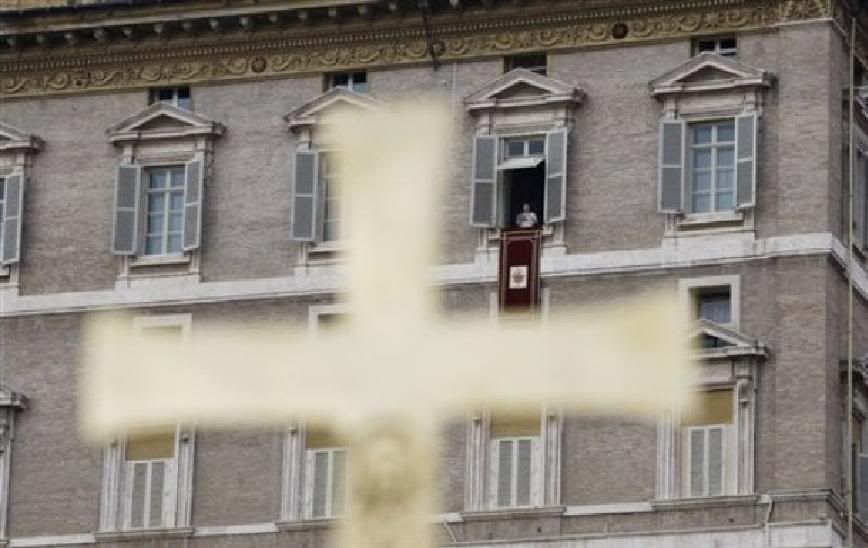
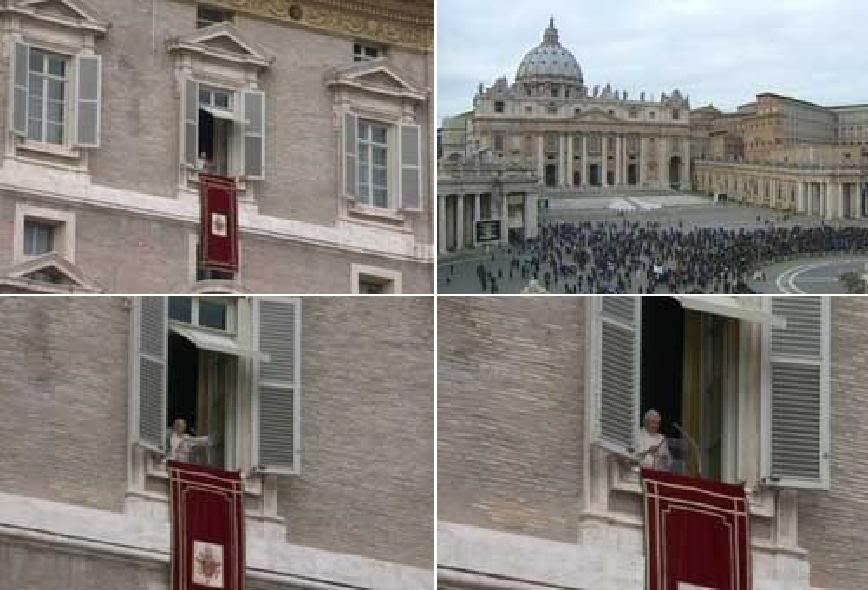 Conversion to Christ
Conversion to Christ
is the way toward communion

23 JAN 20111 (RV) - “We know how many trials face our brothers and sisters of the Holy Land and the Middle East... and we as Christians gather around them, and for all of us this becomes an additional factor of communion.”
These were just some of Pope Benedict XVI’s words at the traditional Angelus with the faithful in St. Peter’s Square this Sunday, which falls in the midst of the Week of Prayer for Christian Unity.
The Pope said this year's Prayer Week theme - "One in the apostles’ teaching, fellowship, breaking of bread and prayer" - was chosen to recall the focus of the original Christian community of Herusalem.
“Only by remaining firmly united to Christ,” can the Church efficaciously conduct her mission, he said, “despite the limitations and failings of her members, despite the divisions (which are) an offense to Christ,” and it is only in Christ that Christians may once again be united thanks to “the inexhaustible strength of his grace.”
Serious commitment to conversion (penitence). the Pope said, is "the way that leads the Church, in God’s own time, to full visible unity.”
After the traditional prayer of Marian devotion, Pope Benedict greeted pilgrims in many languages, including English, in which he spoke of the liturgical proclamation of the generous response of the first disciples to the call of Christ:
The Week of prayer for Christian Unity will conclude this Tuesday, January 25th, with the solemn singing of Vespers to mark the feast of the conversion of St. Paul.
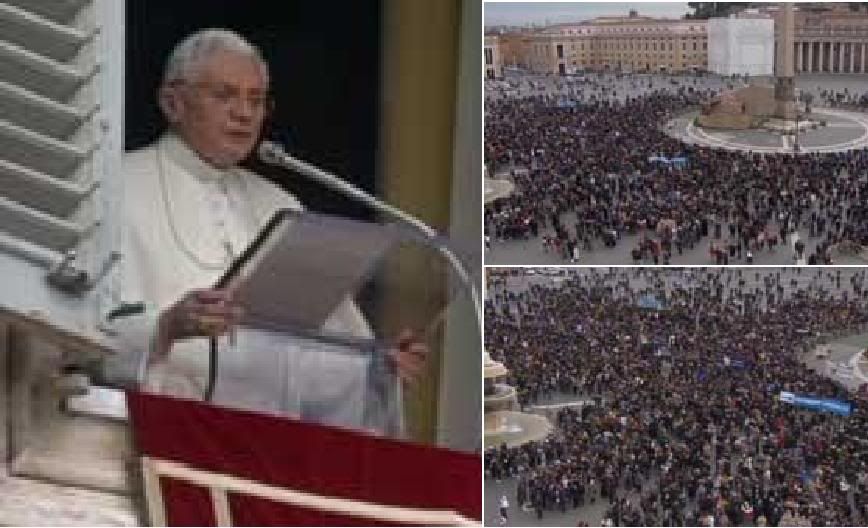 Here is a translation of the Holy Father's words today
Here is a translation of the Holy Father's words today:
Dear brothers and sisters:
These days, from January 18-25, we are observing the Week of Prayer for Christian Unity. This year, its theme is a passage from the Acts of the Apostles which summarizes in a few words the life of the first Christian community in Jerusalem: "They devoted themselves to the teaching of the apostles and to the communal life, to the breaking of the bread, and to prayers" (Acts 2,42).
It is very significant that this theme was chosen by the Churches and Christian communities of Jerusalem, gathered together in the ecumenical spirit. We know how many trials must be faced by our brothers and sisterns in the Holy Land and the Middle East.
Their services thus become even more valuable, attested by testimony that, in some cases, has demanded the sacrifice of lives. Thus, while we welcome joyfully the reflection point offered to us by the Christian communities of Jerusalem, we also gather closely around them as this becomes for everyone another factor of communion.
Even today, in order to be, in this world, a sign and an instrument of intimate union with God and of unity among all men, we Christians must base our life on these four 'hinges': the faith of the Apostles transmitted in the living Tradition of the Church; fraternal communion; the Eucharist; and prayer.
Only in this way, while remaining firmly united to Christ, can the Church effectively fulfill her mission, despite the limitations and shortcomings of her members, despite our divisions, which already, the Apostle Paul had to face in the community of Corinth, as the second Reading this Sunday reminds us:
"I urge you, brothers, in the name of our Lord Jesus Christ, that all of you agree in what you say, and that there be no divisions among you, but that you be united in the same mind and in the same purpose" (1Cor 1,10).
Having said that, he affirmed that every division in the Church is an offense to Christ, and that, at the same time, it is always in Christ, the one Head and Lord, that we can find ourselves reunited through the inexhaustible power of his grace.
This then is the always-relevant call of the Gospel even today: "Repent, because the Kingdom of the Heavens is at hand" (Mt 4,17).
The serious commitment of conversion to Christ is the way that will lead the Church, at the time that God disposes, to full visible unity. A sign of this are the ecumenical meetings taking place these days and multiplying around the world.
Here in Rome, besides the presence of many ecumenical delegations, a meeting begins tomorrow of the Commission for Theological Dialog between the Catholic Church and the Ancient Oriental Churches.
And day after tomorrow, we will conclude the Week of Prayer for Christian Unity with the solemn celebration of Vespers on the Feast of the Conversion of St. Paul.
On this journey, may we be accompanied always by the Virgin Mary, Mother of the Church.
[Modificato da TERESA BENEDETTA 23/01/2011 19:44] |
| |
|
| |
 23/01/2011 22:08 23/01/2011 22:08 |
|
| | | OFFLINE | | Post: 21.994
Post: 4.623 | Registrato il: 28/08/2005
Registrato il: 20/01/2009 | Administratore | Utente Master | |
|
 On the Berlusconi scandal:
On the Berlusconi scandal:
Cardinal Bagnasco to articulate
the Italian bishops' position
at executive meeting tomorrow
by Salvatore Izzo

ANCONA, January 23 (Translated from AGI) - The hall where the 'little Parliament' of the Italian bishops' conference meets tomorrow at the start of their semi-annual meeting faces the port of Ancona, chosen for this meeting because it will host the XXV National Eucharistic Congress in September.
But it won't be the blue of the sea that will dominate the session of the CEI's Permanent Council, nor will it make news for whatever initiatives they decide for the important quinquennial Church assembly which will be closed by the Pope himself in the fall.
Cardinal Angelo Bagnasco, Archbishop of Genoa and CEI president, is expected instead to open the meeting with a new warning on the moral conduct of politicians, giving voice to the concerns and distaste that many Italian Catholics feel about investigations into the private doings of Prime Minister Silvio Berlusconi - sentiments that are independent of whether the investigation will end up formally charging Berlusconi with paying for the services of a 17-year-old young woman, or even of the penal consequences for the alleged offenses that the media have been reporting in great detail.
[A law passed under Berlusconi's first premiership makes it criminal to pay women younger than 18 for sexual favors. Both Berlusconi and the Moroccan teenager involved deny they had sex; the girl says Berlusconi gave her money to pay for some of her expences; and the premier says he has never paid for sexual favors because 'paying for sex deprives a man of the pleasure of conquest'. Berlusconi may be an arrogant, even despicable, narcissist, but he would have to be exceedingly stupid to knowingly violate a law his own government passed. And no one gets to be worth $9-billion and Prime Minister of Italy twice by being stupid. But who knows? Regardless of how it all turns out, Berlusconi must be more discreet about his private activities, and he must apologize to the Pope, at least in private, for the embarrassments he has caused the Church, and publicly to the Italian people for a failure in moral leadership.]
In the past few days, Cardinal Bagnasco himself has said that the 'institutional place' for the bishops to discuss Berlusconi's affairs - and how it impacts the Church and the nation - would be the winter meeting of the CEI Permanent Council.
At the last Council meeting in September, Bagnasco expressed the 'anguish' of the Italian bishops over the general situation in Italy, which has been severely struck by the worldwide economic crisis.
But the recent saturation coverage of alleged 'interceptions' tending to inculpate Berlusconi, as well as protests against the investigative methods used by the police, has aggravated the situation, and the Italian bishops are expected to express themselves strongly.
Thus, there is great anticipation of what he will actually say when he opens the Council meeting tomorrow. It is of course foreseeable that he will be very careful not to lend his words to possible political exploitation of whatever he says.
He has indicated that the Church has not and will not substitute for Parliament and the President of Italy in indicating a way out of the present political crisis.
Nonetheless, writes the Italian bishops' newspaper Avvenire in an editorial today, "all of a sudden, a chorus has arisen urging the Church to intervene strongly in the current political situation."
[When politicians and the media can use anything the Church has to say to support or advance their positions - in this case, to oust Berlusconi from power - then, with unabashed hypocrisy, they not only find the Church 'useful' but even urge her to speak out. But whenever she speaks out to articulate teachings she has expressed for millennia that happen to contradict the dominant political mentality, then she is immediately accused of 'interference' and told to shut up and have nothing to do with the public sphere.]
Without anticipating what Cardinal Bagnasco may say tomorrow about the Berlusconi case, Avvenire points out that any call by the Church and the bishops for moral consistency in what politicians say and do is simply an expression of "the Church's friendship for Italy" and of "a wisdom that cannot be reduced to a partisan slogan but one that can help discern good from evil".
According to the Catechism of the Catholic Church, "the reconciliation of Christians who have committed particularly grave sins, as for instance, idolatry, homicide, or adultery, was linked to a very rigorous discipline, according to which the sinners should make public penitence, often for long years, before being granted reconciliation" .
1,620 years have passed since that was the practice, but the thankless task of admonishing men in public office to follow consistent moral behavior that is respectful of justice continues to be obligatory for bishops. Likewise, the letter written by St. Ambrose as Bishop of Milan to the Emperor Theodosius humiliating him publicly for a bloody repression undertaken by his men, remains quite relevant today.
"If the day after such an atrocious massacre, you had continued to remain within the communion of the Church," wrote Ambrose to one who had been called 'a most Christian emperor', "this would in no way mean absolution of your crime. On the other hand, the public resentment that is already mounting against me would be even more violent if no one had proclaimed that it is absolutely indispensable after sinning to reconcile with God. The Lord forgives our sins only if we repent first".
On Thursday, Cardinal Tarcisio Bertone, asked to comment on the Berlusconi case, said: "The Church urges and invites everyone, especially those who have a public responsibility in any administrative, political or judicial sector, to have and to be committed to a more robust morality, a sense of justice and of legality."
Carefully chosen words which must certainly have been agreed upon with Benedict XVI, whith whom Bagnasco met yesterday, as he does on the eve of these CEI meetings. [The Pope is both Bishop of Rome and Primate of Italy, and acts in Italy through the CEI. Two Italian newspapers today, Corriere della Sera and La Repubblica, led off their Bagnasco-CEI stories by directly linking Bagnasco's opening speech tomorrow to hypothetical 'instructions' from the Pope.]
He will most certainly quote from the Pope's address to the police force of Rome Thursday, when he spoke of the risk that in Italy, "the structures that are the bases for living together can no longer function fully" because of a decline in the 'moral consensus' even as "a sense of insecurity, due primarily to social and economic uncertainty, but sharpened by a certain weakening in the perception of ethical principles on which law and personal moral attitudes rest - principles that have always strengthened the social order".
Six weeks ago, when Cardinal Bagnasco opened the full assembly of the Italian bishops' conference in Assisi, he spoke of a "the collapse of standards of quality on the political scene that must be weighed objectively... without making excuses and without exploitation, by all those who have the good of the naion at heart and not only their own partisan or political interests".
If the people lose confidence in the political class, he said, then they will retreat into themselves, fail to have any desire to participate in society, but above all, "reduce the dynamic social compactness that is absolutely necessary in order to deal with problems together and work for a better future for the country".
For his part, the Patriarch of Venice, Cardinal Angelo Scola, issued a statement saying that "The bishops of Italy are more than ever cohesive on doctrinal and moral questions, on which they are prepared to make clear statements".
The Church in Italy, he continued, "recognizing its tasks and without intending any interference, chooses from time to time when and how she can communicate its judgments on questions that we feel to be substantial and fundamental for orienting the faithful and to make our contribution to the good fo society", he added.
According to the weekly magazine Famiglia Cristiana, since this new scandal over Berlusconi erupted, the apparent division among Italian Catholics since Berlusconi's second ascendancy to power in 2009, appears to have cleared up for now.
Reactions have mostly held the same line, from Avvenire which has conveyed the disconcertment of its readers, to L'Osservatore Romano [which kept clear of Berlusconi's scandals in 2009), which has published the Italian President's statements expressing his 'perturbation' over the Prime Minister's alleged misdeeds, and his subsequent call on the appropriate institutions to carry out the necessary investigations in order to clear up the case promptly and properly.
In the NOTABLES thread, I have posted an excellent analysis by a non-Western journalist, of the Berlusconi scandal and how Italians are reacting; as well as an editorial from today's Il Foglio by Giuliano Ferrara who has a balanced view of Berlusconi and does not paint him as purely villainous.
[Modificato da TERESA BENEDETTA 24/01/2011 02:41] |
| |
 24/01/2011 20:02 24/01/2011 20:02 |
|
| | | OFFLINE | | Post: 21.997
Post: 4.625 | Registrato il: 28/08/2005
Registrato il: 20/01/2009 | Administratore | Utente Master | |
|
2011 has been bad for me so far - the Time-Warner service to my area was interrupted late last night, leaving me without TV, internet or telephone servicem since they are all bundled together. The service has just resumed now, after more than 12 hours. I will try to make up for lost time now...
|
| |
 24/01/2011 20:45 24/01/2011 20:45 |
|
| | | OFFLINE | | Post: 21.998
Post: 4.626 | Registrato il: 28/08/2005
Registrato il: 20/01/2009 | Administratore | Utente Master | |
|

 I began this post two days ago, in the preceding page, and I am re-posting the Ratzinger excerpt I posted earlier, along with a translation of Vian's foreword to the 2009 edition of the book, and a book review = all published in the 1/2311 issue of OR.
Joseph Ratzinger and political theology
Translated from the 1/23/11 issue of
I began this post two days ago, in the preceding page, and I am re-posting the Ratzinger excerpt I posted earlier, along with a translation of Vian's foreword to the 2009 edition of the book, and a book review = all published in the 1/2311 issue of OR.
Joseph Ratzinger and political theology
Translated from the 1/23/11 issue of

In the autumn of 1962, Joseph Ratzinger gave a lecture at the Salzburger Hochschule (Salzburg University of Education) on the occasion of their annual theological week. A brief excerpt was published in the magazine Der katholische Gedanke(Catholic thought) (19, 1963, pp 1-9) and a much larger part was printed earlier in Studium generale (14, 1961, pp. 664-682).
The two articles were then re-elaborated as a book, Die Einheit der Nationen (1971), which was translated to italian in 1973, and republished in 2009 with Giovanni Maria Vian as editor (Brescia, Morcelliana, 2009 120 pp).
In this issue, we publish an excerpt from the final chapter of the book, the introduction written by Vian for the 2009 edition, and a review of the book written by one of the leading scholars of Patristics and the history of Christianity.].
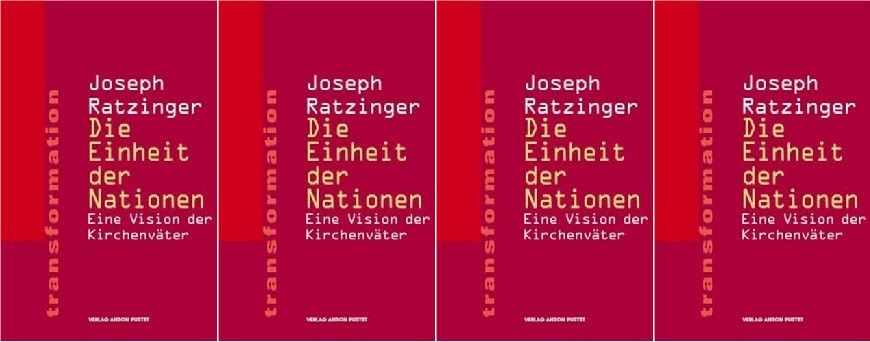 DIE EINHEIT DER NATIONEN: Eine Vision der Kirchenvaeter
DIE EINHEIT DER NATIONEN: Eine Vision der Kirchenvaeter
(The Unity of Nations: A vision of the Church Fathers)
by Joseph Ratzinger
First published 1971
Without truth, politics
is worship of the demon
by JOSEPH RATZINGER
With Augustine as with Origen, theology's hook into political reality was a rhetorical necessity. The fall of Rome in 410 to Alaric and the Huns had reawakened pagan reaction to Christianity. Where are the tombs of the Apostles, they demanded?
Obviously, the Apostles could not in any way defend Rome, the city which had been invincible for as long as it was under the protection of its guardian pagan gods. But the defeat of Rome demonstrated with tangible evidence that God the Creator, adored by Christians, was not concerned about political affairs. This God could be competent for man's beatitude in the afterlife, but events had just proved effeictively that he was not competent in the political reality of the world.
Politics obviously had its own structure of laws that did not have anything to do with the supreme God, and therefore it had to have its own political religion. It was what the masses wanted out of a general sensibility, namely, that alongside elevated religion, there should be a religion of earthly things, especially of political matters, capable of motivating people more profoundly, as the ancient philosophers maintained.
Simply recall that axiom of Platonic thought formulated by Apulieus: "Between God and man there is no possibility of contact". Platonism was convinced profoundly of the infinite distance between God and the world, between spirit and matter. That God would be directly concerned with matters of the world appeared to them totally impossible.
And any divine service that had to do with worldly affairs was done through intermediate beings, forces of a diverse nature that one had to resort to.
In this excessive emphasis on God's transcendence - which meant segregating him from the world, excluding him from the concrete processes of life on earth - Augustine rightly perceived the true and proper nucleus of resistance against the totality of the Christian claim, a resistance that could never tolerate marginalization of political reality in the name of the one God.
To the pagan reaction which tended to restore a religious dimension to the polis, and thereby relegate the Christian religion to the purely private sphere, Augustine countered with two fundamental objections.
Political religion has no truth whatsoever. It rests on the canonization of the habit against truth. This renunciation of truth - rather, opposition to truth out of love for what was habitual and customary - was even admitted openly by representatives of that Roman political religion - Scevola, Varrone, Seneca, who defended tradition to the degreee that they opposed truth. For them, their concern for the polis and its good justified this assault on truth.
This meant that the good of the State, which they believed was linked to its persistence and survival in its ancient forms, was placed above and beyond the value of truth.
Here Augustine sees the true contrast erupt in all its acuteness: In the Roman concept, religion was an institution of the State, therefore one of its functions, and therefore, subordinate to it.
Religion was not an absolute independent of the interests of the group representing it, but was an instrumental (exploitable) value for the State which was the absolute.
On the contrary, according to the Christian concept, religion does not have to do with habit or custom, but with the truth which is absolute, and which therefore cannot be instituted by the State - by and in itself, it had instituted a new community which embraces everyone who lives in God's truth.
Starting with this concept, Augustine thought of the Christian faith as a liberation - a liberation of the truth from the constraints of custom.
The political religion of the Romans had no truth at all, but there is a truth above and beyond it. Such truth is that the subjection of man to habits that are hostile to truth makes him prey to anti-divine forces which the Christian faith calls demons.
That is why worship of idols is not just a foolish occupation without purpose, but by leaving men prey to the negation of truth, it becomes worship of demons: Behind unreal gods is the supremely real power of the demon, and behind slavery to custom is servility to the orders of evil spirits.
This is the profound object of Christian liberation and of the freedom that it conquers: a liberation from custom stamped by a power that man himself had created, but which in time and at length had raised itself above man and was now its lord and master. It had become an objective power itself, independent of man, the spearhead of the power of evil itself that would overwhelm man, the power of demons.
Liberation from custom in order to reach truth is emancipation from the power of the demons which are behind custom. In this sense, the sacrifice of Christ and of Christians become truly understandable as 'redemption', or liberation - eliminating the political cult that is against truth, and replacing this worship of demons with the only universal service to truth, namely, freedom.
Thus, Augustine's thought joins that of Origen.
Just as Origen understood the religious absolutism of the nation State as the work of man's demons, and the supranational unity of Christians as a liberation from the prison of ethnic factors, Augustine also consigns political reality in the ancient sense - as divinization of the Polis - to the category of the demoniacal, and sees in Christianity the overcoming of the demoniacal power of politics which had oppressed the truth.
He too considered the pagan gods not as empty illusions but as the fantastical mask which hid those 'powers and dominations' which prevent man's access to absolute truths and imprison him in relativism. And he, too, saw politics as the true and proper dominion of these dark powers.
It is true that Augustine saw his own measure of truth in the idea of Evemero [Greek writer of the 3rd century BC] that all gods were once men, i.e., that every pagan religion was based on man's hyperbolization of himself. But he also saw that this admission did not resolve the enigma of pagan religions.
The dark powers, which apparently man himself causes to issue and project from himself, soon show themselves to be objective hypostases of power, 'demons' which exercise on him a supremely real mastery - from which he can be liberated only by him who has power over all other powers, God himself.
We must note that even Augustine did not attempt to elaborate anything that was meant to constitute a world that had become Christian. His civitas Dei, city of God, is not just an ideal community of all men who believe in God, but neither does it have anything in common with an earthly theocracy or a world that is Christianly constituted. Rather, it is a sacramental-eschatological entity that lives in this world as a sign of the future world.
He himself demonstrated how precarious was the Christian cause in 410,
when it was not just the pagans who invoked Rome's most ancient gods. That is why for him, the State - even despite its real or apparent Christianization [under Constantine] - remained an 'earthly State', in which the Church was a community of strangers to this world, who accept and use earthly realities but are not at home in it.
Certainly, the coexistence of the two communities, pagan and Christian, was much more peaceful than it was in the time of Origen. Augustine no longer spoke of conspiring against the 'scythian' (i.e, barbarian] State, but thought it right that Christians, members of the eternal homeland, should render service in Babylon, so to speak, as functionaries, even as emperors.
Therefore, whereas in Origen, one does not clearly see how this world could continue, but only that it must tend to an escatological opening, Augustine considered the 'permanence' of the situation in his time, which he thought was right for that era, to the point that he wished for a renewal of the Roman Empire.
But he remained faithful to the eschatological thought insofar as he considered the world a provisional entity upon which he therefore did not seek to confere a Christian constitution, but would let it continue to be the world which must continually struggle to achieve its own relative order.
In this measure, even Christianity that had been consciously legalized in this world, ultimately remained 'revolutionary', since it cannot identify itself with any State: It remains a force that relativizes all the immanent realities in the world, indicating and referring everything to the one absolute God and the one mediator between God and man - Jesus Christ.
The only Absolute
in a provisional world
by Giovanni Maria Vian
Foreword to 2009 Italian edition
Translated from the 1/23/11 issue of

Already there is all of Ratzinger in this little book, a text that is as valuable as it is little known, and which goes back to his younger years as a university professor.
At the start of the 1960s, the theologian who had recently been appointed professor at the University of Bonn, nad anticipated its fundamental ideas in two substantial articles, which he would rework into the book published a decade later and almsot immediately translated to Spanish, Italian and Portuguese.
In the center is the problem of politics, confronted by the method that has characterized the author since his formation for the priesthood - namely, a historical and theological analysis, referred particularly to the Christian tradition, rethought with creativity and caution.
In this, he follows the attitude which characterized the Biblicist Friedrich Stummer, who specialized in the Old Testament, whom Joseph Ratzinger would describe half a century later in his autobiographical memoir as "a quiet and reserved man, whose strength was strictly historical and philological work – he would hint at theological themes only with the greatest restraint. I greatly appreciated this scholarly carefulness”.
For this book, the interest of the young scholar was addressed exclusively to the ancient world and the Fathers of the Church, represented by two important and very significant names: Origen and Augustine.
In his early 30s, Ratzinger in confronting the subject he had chosen, demonstrated an uncommon familiarity with ancient sources, and at the same time, an acute sensitivity to contemporary culture.
His study of Patristics imposed an oiginal approach to his research of a subject, political theology, which in the second half of the 1960s, became relevant, as the author notes in his foreword, and as indicated by the subtitle of of the first translation of the book (in Spanish): Aportaciones para una teología política.(Contributions towards political theology).
A debate on the subject in the period immediately ollowing the Second Vatican Council demonstrated new developments and emphases, but whose deeper line was prepared for between the two world wars, especially by the 'ideal' debate between Schmitt and Erik Petersen (mot by chance, the latter's name is often mentioned) [See Benedict XVI's discourse about Petersen last year].
The world and culture of antiquity as a context was always of great interest to the young Ratzinger, who as a high school student, was an enthusiast of the Latin and Greek classics. In the first few months after the war, the 18-year-old seminarian-to-be wrote Greek hexameters to while away the time as when he was a prisoner of war.
Then for years, he became a passionate reader of the Fathers of the Church in the critical editions of their works published in connection with their rediscovery by historians and theologians in Germany and France.
The results of this rigorous and demanding formation, which flowered into his doctpral thesis on St. Augustine and his travail-ridden Habilitation dissertation on Bonaventure, were already ripe in his brief study on "Humanity and political dimension in the vision of the pririmitive Church" which was the origin of this book, an attentive reading of which will show reflections and themes that are recurrent in the mature Ratzinger - and now in Benedict XVI - with a truly impressive consistency.
Addressing the political theology of the Greco-Roman world with its widespread idea of a correspondence of human kingdoms to the divine monarchy, and evoking the philosophical opposition of diverse political orders in the name of cosmopolitanism (which much later would offer links to the Christian order), Ratzinger clearly underscores how the limits of every political and even theological vision are set by the Sacred Scriptures, Hebrew and Christian (of which he proposes without hesitation a canonical reading as transmitted by Church Tradition, in which individual parts refer to each other integrally) - and Biblical faith.
This also gives rise to his opposition to every political absolutization of Christianity, which was seen in the ancient world as a 'revolutionary entity', even if such absolutization was tempered.
At the same time, there was the disquieting presence of gnosticism, which in the early centuries, was like the malignant shadow of Christianity, radically different from it by opposing the world to its creator, and therefore characterized by a fundamental anarchy.
Ratzinger, who proved to be very much abreast with the scientific debates over the origins of gnosticism, and, with refined philological attention, highlights the conviction of pagan intellectuals like Celsus and Plotinus who identified it with Christianity, gives a historical and theological reading of gnosticism that sees it consistently as being ranged 'on the side of the serpent (devil)'.
This Ratzingerian description recalls that of the great adversaries of gnosticism in antiquity, who represented it as “a tonality of the spirit whose energies had been building up over time as to make ripples” that, not by chance, emerged into the open and became widespread with the appearance of Christianity, and which - in a diabolical way, precisely - would accompany it throughout its early history.
As we indicated earlier, Ratzinger underscores the fact that philosophical opposition, starting with the Stoics, to the dispositions of States, links up to Christian opposition, "but the philosophers' apolitical ideal and individualistic cosmopolitanism about 'citizens of the world'” was surpassed with the coming of Christ, who is the 'mystery of unity' and who animates that 'Christian brotherhood' to which the young theologian had dedicated his first published monograph ( Die christliche Bruederlichkeit) after his theses on Augustine and Bonaventure.
In the Jewish and Christian view, attention shifts to 'nations' (and their angels and demons) that were born, so to speak, after the dispersion of Babel, and it is in this factor of nation that is one the principal points of Origen's polemic against Celsus [a 2nd-century Greek philosopher who wrote the earliest known book attacking Christianity].
Likewise, Origen's De principis establishes 'the theological metaphysics of the nation' elaborated by that great Christian intellectual of Alexandria, who underscores the fundamental irreducibility – for eschatological reasons – of the Christian revolution in the world, and thus, of every political system.
Even more fundamental is Augustine's reflection on political theology, developed most specially in De civitate Dei[The City of God]. This truly epochal work, occasioned by the echoes of the unprecedented sack of Rome by the Huns, obviously deals with a totally new situation, after the Constantinian turning point [making Christianity the state religion] and its elaboration by the historian Eusebius of Caesarea (Ratzinger remarks more on its theological rather than historical dimension, which he does not ignore, but on the contrary, he makes refined observations on it).
The theologian quickly notes how his beloved Bishop of Hippo describes the Christian faith in terms of the relationship between God and the world. Thus, in the face of Stoic monism, he maintains the absolute Otherness of God the Creator, and in the face of the Platonic insistence on divine transcendence, he affirms faith in the incarnation of Christ.
For Augustine, in short, as Ratzinger summarizes it, “the God of creation is also the God of history”. And precisely because of this, every human construction is relative because it always remains human, or as Augustine puts it, “What are all men but merely men?”
But unlike Origen, Augustine insists on the permanent presence of the Church in the unity of nations pre-announced at Pentecost - “Already the Body of Christ speaks all languages, and those that it does not yet speak, it will” - whereas Origen considers the Church as primarily an eschatological sign.
As for relationship with political structures which remain worldly, the realism of Augustine's doctrine proposes neither an 'ecclesialization' (Verkirchlichung) of the state nor the 'statalization' (Verstaatlichung) of the Church.
The aspiration, shared by Ratzinger, is something else: namely, to “make present the new power of faith' in this provisional world. And Christianity relativizes all reality, including the political, because it looks at the only Absolute.
Origen of Alexandria, considered the first Christian theologian, is a fascinating lay figure to whom Benedict XVI devoted two catecheses in early 2007
www.vatican.va/holy_father/benedict_xvi/audiences/2007/documents/hf_ben-xvi_aud_20070425...
www.vatican.va/holy_father/benedict_xvi/audiences/2007/documents/hf_ben-xvi_aud_20070502...
in his cycle of the great thinkers of early Christianity. If Origen had been a bishop or saint, he would be numbered formally among the Fathers of the Church, even if his reputation in the Church has waxed and waned through the centuries. If I am not mistaken, he is the only non-saint who has been a subject of Benedict XVI's catechesis.
Here is the third article in this OR special presentation - a rather lengthy book review of this early work of Joseph Ratzinger.
Christianity: The revolution
that overturned the concept of power
A review of Joseph Ratzinger's
L'unità delle nazioni:
Una visione dei Padri della Chiesa
by Manlio Simonetti
Translated from the 1/23/11 issue of

In his introduction to this petit livre, its editor, Giovanni Maria Vian, highlights its pioneering characteristic at the time it was written in the 1960s, when the fortunes of so-called political theology were just dawning.
In fact, even if the book was first printed in 1973, it was an elaboration of two previous studies from 1961 and 1963.
Its subject, the unity of nations, even if it covers pagan and Christian reflections in general, is focused on those of two authors, Origen and Augustine. And while we can more than take for granted the presence of Augustine since his fortunes have never eclipsed between his time and ours, one must remark the centrality given by Ratzinger – newly named professor at the University of Bonn, philosopher but when necessary, also a philologist – to Origen, who, with Augustine, shares the fame of being the supreme representative of Christian thought in antiquity, but whose fortunes and memory have been 'ditched' many times in the past because of the repeated condemnations of him in the 3rd to the 6th centuries, and of certain aspects of his thought which was the polar opposite of that of Luther and Calvin, as well as of Augustine himself.
It was only after the Second World War that the central significance of Origen's thought among the Fathers of the Church began to be revalued by French scholars and later, by Italians, whereas in Germany, despite the forward-looking monograph of Voelker published in 1931, ancient and strong reservations about Origen receded only slowly and gradually.
So, in this sense, Ratzinger's position on Origen certainly went against the current, as is the importance he gave to Gnostic thought, overvalued at the time by the dominant pan-Gnosticism of Hans Jonas, but which anticipated the results of Antonio Orbe's research on the global understanding of ancient Christian theological thought, without any barriers between orthodoxy and heresy.
Initially, Ratzinger highlights, in the context of Greek philosophical thought, the position of the Stoics who had discovered “behind the diversity of structures, the unity of the essence of 'man', man's humanity itself, which subsists through all time and space” (p. 20).
The pantheistic concept in Stoic philosophy, more specifically, the Aristotelian idea of divine monarchy, found its political realization in the Roman empire. To this pantheistic concept in Stoic thought, Ratzinger counterposes the Old Testament faith in one God “who stands free before the world” (p. 26).
According to this faith, the initial unity of man was shattered by sin, and the recovery of unity is projected into to the future, towards the moment when all peoples would converge in Jerusalem as the center of a new united humanity.
The contraposition of these two concepts was sharpened in Christianity by the advent of Christ as the new Adam, with whom, after Adamite man, “a second and definitive humanity began” - that of Christians, who having overcome the natural character of the human condition through participation in the death and resurrection of Christ, “claimed the distinction of being the second and definitive human race, which was already building itself in the midst of the old humankind” (p. 28).
The Christian Church was the new world which, though alien to every form of violence, opposed the Roman world insofar as it pre-announced itself as the definitive and true world, to which the ancient world “would one day have to yield” (p. 29).
At this point, Ratzinger juxtaposes to the Christian revolution the gnostic ascendancy which was revolutionary in a very different way: “It rejected the world in its entirety along with its God, whom it unmasks as a dark tyrant and jailer, seeing in God and religions only the seal and the definitive closure of that prison which is the world” (p. 32).
These pages of Ratzinger's book, inspired by the interpretation that Hans Jonas had given to gnosticism and which was dominant in Germany and the United States in the 1960s, must now be re-evaluated along with that interpretation, in that the rejection of the material world had remained at the stage of mere theory with the Gnostics, without being realized as a concept of true and proper political theology. The Gnostics were loyal to the Roman state, and because of this, beyond other more important doctrinal reasons, they were, to say the least, unpopular with the Catholic faithful.
In opposition to gnostic nihilism, Catholic thought, while not minimizing the damages of sin, has always affirmed the goodness of the world as the world created by the one supreme God, and despite the conviction that in a future time, the Roman empire – considered eternal by the Romans – would come to an end and be replaced by the kingdom of Christ, Christians in affirming that every power comes from God, giving rise to the separation between what belongs to God and what belongs to Caesar, did not see any reason to reject the empire as long as it did not violate the preeminent right God has over man.
To this reasoning was added the concept of the unity of all men in Christ: St. Paul already thought of the Church as the Body of Christ, understood as the only new man (p. 37). Becoming man in Christ, God drew man to him, into unity with God, such that “Jesus Christ and his message introduced a new dynamic into mankind, the dynamic of passage from the lacerated being of many individuals to the unity of Jesus Christ, of God. The Church is, so to speak, nothing other than this dynamic, this movement by part of mankind in the direction of unity with God” (p. 40).
This mystery of unity, which is ritually centered on the Eucharistic banquet and nourished by the more general belief that all men become brothers in Christ, “is realized in the individual as a passage from the sovereignty of his own ego to the unity of the members of the body of Christ” (p. 42).
Factually, this unity finds concrete realization in the network of communities, the local churches, which although they are materially autonomous of each other, are in fraternal communion among themselves and in God, realizing “the ultimate purpose of the coming of Christ” (ibidem).
Origen's reflection on the unity of Christians took on consistency in his debate with the pagan philosopher Celsus, who reproached Christians for having abandoned national laws. Celsus had a vision of the unity of various peoples as different entities - administered superhumanly, under the aegis of the supreme God, by minor divinities, which the ancient Jews called 'angels of the nations' - harmonically living together in the superior political unity represented by the Roman empire.
Origen accepted and adopted the Jewish doctrine of the 'angels of the nations' but he based it on its most characteristic and important sxiom : Only Israel, among all the peoples on earth, was not entrusted to the governance of an angel, but remained under the direct dominion and protection of God (Deut 32,8-9).
In this sense, the dominion of angels over single peoples was predominantly but not completely considered negative by Origen. He deduced that “the salvific work of Christ... consists precisely in the fact that he triumphed over the archons [the angels of the nations] and led mankind out of the prison of the national factor into unity with God, the unity of one humanity” (p. 54).
We have said that Origen's thinking about the angels of the nations was predominantly but not completely negative. Indeed, in what has come down to us of Origen's writings, there is no lack of points in which these angels are considered as those who transmitted to men their science, their knowledge of the world, poetry, grammar, rhetoric, music, etc – but nonetheless, a science of the world, not the wisdom of God that was made made manifest in Christ (p. 60).
In effect, “Origen, confronting Celsus, does not deny that the Christian faith implies a practical breach of the ancient principle of a national political link to the religious fact. Christians had truly abandoned the ancient links... Their leader is Christ, whom they follow as the new mankind in whom swords have been transformed to plows and lances to scythes... In Christ, Christians had become children of peace... In place of the absolute dominion of national laws, the Christian had substituted the law of Christ, who had proclaimed the ancient laws null and void... In place of the limited order of nations, has entered the only law of God, which by virtue of Jesus Christ, is in force for all of the ecumene” (pp 63.-64).
Given these conclusions, Origen rejects Celsus's invitation for Christians to commit themselves concretely and actively in behalf of the empire: Christians cannot bear arms, they cannot take public office, and they believe it is right to transgress the laws of the state for love of the law of Christ.
Or, better said: Christians could commit themselves in behalf of the empire, but only from the superior viewpoint of service to God which extends to the good of one's neighbor, which is to say, the whole world (p. 70).
The new order contemplated by Origen was destined to be realized only in eschatological perspective, at the end of time, since the persistence of the pagan empire impeded any prospect in the present or in the near future.
But the radical change that took place between the Church and Constantine's empire imposed a radical re-examination of the future of the empire itself in the present world.
This rethinking was done by Eusebius of Casearea, who theorized that the empire turning Christian was an installation of the messianic kingdom by Constantine, the new Moses.
One cannot fail to note Eusebius's almost complete absence in Ratzinger's work, which goes from Origen to Augustine. The fall of Rome to the Goths in 410 had shattered the symbiosis between the Western empire and the Church that was so desired by the great historian.
Against the pagan aristocracy who interpreted the decadence of Rome as a punishment for the emperor who had dismissed the traditionalists, Augustine in the City of God decisively contests the truth and significance of the political religion of the traditionalists, which made men prey to demons.
In this context, “the sacrifice of Christ and Christians now becomes truly undrstandable as 'redemption', namely, liberation: it eliminates political worship that is against truth, worship of demons, and in its place, it places the only universal service to truth, which is freedom” (p. 84).
In the philosophical sense, contesting both the divinization of the world affirmed by Stoic pantheism and the excessive divinism preached by Platonism (which Ratzinger emphasizes), Augustine proposes the Christian belief in the world as God's creation, and in the function of the incarnation of Christ as the presence of God in human history.
From this follows his bivalent and basically negative view of Roman power, which he considered the result of prisca virtus Romana old Roman virtue) as well as of boundless ambition: “The Romans sought and received a kingdom on earth in place of the eternal kingdom, earthly fame in place of enduring glory. The Roman empire, sign of grandeur, was at the same time the portent of their perpetual blame.....“ (p. 95).
Augustine acknowledged the positive value of empire, his fatherland, capable of good administration, aiming for the earthly wellbeing of its subjects, but with relative values against the absolute value of the eternal fatherland of all men, the heavenly city - conceived not only as an eschatological reality, but even now as 'the people of God in pilgrimage through the desert of the earthly kingdom, the Church”, which in this world lives like a stranger in exile because its true place is elsewhere (p.104).
Living in this world, the Church must necessarily live with the State: Augustine clearly took account of the need to endure within earthly kingdoms with all their imperfections. While Origen, who was active at a time when Christianity was religio illecita, looked towards the end of the world for a realization of the heavenly city, Augustine, less revolutionary, saw the Church at work as the official religion of the empire, which embraced all people in its extent and united in love all the languages that sin had diversified.
The Church, moreover, against every easy temptation of earthly power, should not have 'the least in common with an earthly theocracy, with a world that is Christianly constituted – rather it is an entity that is eschatological and sacramental that lives in this world as a sign of the future world” (p. 113)

[Modificato da TERESA BENEDETTA 24/01/2012 15:45] |
| |
 24/01/2011 21:09 24/01/2011 21:09 |
|
| | | OFFLINE | | Post: 21.999
Post: 4.627 | Registrato il: 28/08/2005
Registrato il: 20/01/2009 | Administratore | Utente Master | |
|

 Monday, January 24, Third Week in Ordinary Time
Monday, January 24, Third Week in Ordinary Time
 Third illustration from left, St. Francis de Sales with St. Frances de Chantal; extreme right, the statue of St. Francis in St. Peter's Basilica.
ST. FRANCOIS [Francis] DE SALES (France 1567-1622), Bishop, Writer, Doctor of the Church
Third illustration from left, St. Francis de Sales with St. Frances de Chantal; extreme right, the statue of St. Francis in St. Peter's Basilica.
ST. FRANCOIS [Francis] DE SALES (France 1567-1622), Bishop, Writer, Doctor of the Church
Born to a noble family in Savoy, Francis had the best education possible in his time, with degrees from the universities of Paris and Padua. He chose to become a priest over the civil career his family expected him to pursue. Because of their connections, he was appointed Provost of Geneva by its bishop. Geneva was the center of the Calvinist movement, and Francis dedicated himself to converting Calvinists, writing catechetical pamphlets for that purpose. He was a spellbinding preacher, a gentle pastor and ascetic in his own life. At age 35, he became Bishop of Geneva but continued to preach, hear confessions and catechize children. He wrote two books, the Introduction to the Devout Life and A Treatise on the Love of God, along with many pamphlets and a vast correspondence. His writings, characterized by his gentleness, are addressed to lay people, to make them understand that they too are called to be saints. With St. Frances de Chantal, he founded the Sisters of the Visitation whose members can choose to do community work or a contemplative life. He was canonized in 1661, not long after his death, and proclaimed a Doctor of the Church in 1877, In 1963, he was named the patron saint of writers and journalists. He inspired St. John Bosco who named the religious order he founded Salesians of Don Bosco (SDB).
Readings for today's Mass: www.usccb.org/nab/readings/012411.shtml
No OR today.
PAPAL EVENTS TODAY
The Holy Father met today with
- Cardinal Stanisław Ryłko, President of the Pontifical Council for the Laity
- Cardinal Jean-Louis Tauran, President of the Pontifical Council for Inter-Religious Dialog
- Delegation of the Evangelical Lutheran Church of Germany. Address in German.
The Vatican today released"
- The Holy Father's Message for the World Day of Social Communications
- The Holy Father's schedule of liturgical celebrations from February to April
- A communique on the recent meeting in Bangalore of CDF theologians with the bishops and theologians of India
- The Holy Father's telegram of condolence for the death of Madame Tullia Zevi, former president of the
Union of Italian Jewish Communities
|
| |
 24/01/2011 21:57 24/01/2011 21:57 |
|
| | | OFFLINE | | Post: 22.000
Post: 4.628 | Registrato il: 28/08/2005
Registrato il: 20/01/2009 | Administratore | Utente Master | |
|
 Here is the English text of the Holy Father's Message for this year's World Day for Social Communications. It was presented at a Vatican news conference today by Archbishop Claudio Maria Celli, president of the Pontifical Council for Social Communications:
Here is the English text of the Holy Father's Message for this year's World Day for Social Communications. It was presented at a Vatican news conference today by Archbishop Claudio Maria Celli, president of the Pontifical Council for Social Communications:
Dear Brothers and Sisters,
the occasion of the 45th World Day of Social Communications, I would like to share some reflections that are motivated by a phenomenon characteristic of our age: the emergence of the internet as a network for communication.
It is an ever more commonly held opinion that, just as the Industrial Revolution in its day brought about a profound transformation in society by the modifications it introduced into the cycles of production and the lives of workers, so today the radical changes taking place in communications are guiding significant cultural and social developments.
The new technologies are not only changing the way we communicate, but communication itself, so much so that it could be said that we are living through a period of vast cultural transformation. This means of spreading information and knowledge is giving birth to a new way of learning and thinking, with unprecedented opportunities for establishing relationships and building fellowship.
New horizons are now open that were until recently unimaginable; they stir our wonder at the possibilities offered by these new media and, at the same time, urgently demand a serious reflection on the significance of communication in the digital age.
This is particularly evident when we are confronted with the extraordinary potential of the internet and the complexity of its uses.
As with every other fruit of human ingenuity, the new communications technologies must be placed at the service of the integral good of the individual and of the whole of humanity. If used wisely, they can contribute to the satisfaction of the desire for meaning, truth and unity which remain the most profound aspirations of each human being.
In the digital world, transmitting information increasingly means making it known within a social network where knowledge is shared in the context of personal exchanges. The clear distinction between the producer and consumer of information is relativized and communication appears not only as an exchange of data, but also as a form of sharing.
This dynamic has contributed to a new appreciation of communication itself, which is seen first of all as dialogue, exchange, solidarity and the creation of positive relations.
On the other hand, this is contrasted with the limits typical of digital communication: the one-sidedness of the interaction, the tendency to communicate only some parts of one’s interior world, the risk of constructing a false image of oneself, which can become a form of self-indulgence.
Young people in particular are experiencing this change in communication, with all the anxieties, challenges and creativity typical of those open with enthusiasm and curiosity to new experiences in life.
Their ever greater involvement in the public digital forum, created by the so-called social networks, helps to establish new forms of interpersonal relations, influences self-awareness and therefore inevitably poses questions not only of how to act properly, but also about the authenticity of one’s own being.
Entering cyberspace can be a sign of an authentic search for personal encounters with others, provided that attention is paid to avoiding dangers such as enclosing oneself in a sort of parallel existence, or excessive exposure to the virtual world.
In the search for sharing, for "friends", there is the challenge to be authentic and faithful, and not give in to the illusion of constructing an artificial public profile for oneself.
The new technologies allow people to meet each other beyond the confines of space and of their own culture, creating in this way an entirely new world of potential friendships. This is a great opportunity, but it also requires greater attention to and awareness of possible risks.
Who is my "neighbour" in this new world?
Does the danger exist that we may be less present to those whom we encounter in our everyday life?
Is there is a risk of being more distracted because our attention is fragmented and absorbed in a world "other" than the one in which we live?
Do we have time to reflect critically on our choices and to foster human relationships which are truly deep and lasting?
It is important always to remember that virtual contact cannot and must not take the place of direct human contact with people at every level of our lives.
In the digital age too, everyone is confronted by the need for authenticity and reflection. Besides, the dynamic inherent in the social networks demonstrates that a person is always involved in what he or she communicates.
When people exchange information, they are already sharing themselves, their view of the world, their hopes, their ideals. It follows that there exists a Christian way of being present in the digital world: this takes the form of a communication which is honest and open, responsible and respectful of others.
To proclaim the Gospel through the new media means not only to insert expressly religious content into different media platforms, but also to witness consistently, in one’s own digital profile and in the way one communicates choices, preferences and judgements that are fully consistent with the Gospel, even when it is not spoken of specifically.
Furthermore, it is also true in the digital world that a message cannot be proclaimed without a consistent witness on the part of the one who proclaims it.
In these new circumstances and with these new forms of expression, Christian are once again called to offer a response to anyone who asks for a reason for the hope that is within them(cf. 1 Pet 3:15).
task of witnessing to the Gospel in the digital era calls for everyone to be particularly attentive to the aspects of that message which can challenge some of the ways of thinking typical of the web.
First of all, we must be aware that the truth which we long to share does not derive its worth from its "popularity" or from the amount of attention it receives. We must make it known in its integrity, instead of seeking to make it acceptable or diluting it. It must become daily nourishment and not a fleeting attraction.
The truth of the Gospel is not something to be consumed or used superficially; rather it is a gift that calls for a free response. Even when it is proclaimed in the virtual space of the web, the Gospel demands to be incarnated in the real world and linked to the real faces of our brothers and sisters, those with whom we share our daily lives.
Direct human relations always remain fundamental for the transmission of the faith!
I would like then to invite Christians, confidently and with an informed and responsible creativity, to join the network of relationships which the digital era has made possible.
This is not simply to satisfy the desire to be present, but because this network is an integral part of human life. The web is contributing to the development of new and more complex intellectual and spiritual horizons, new forms of shared awareness.
In this field too we are called to proclaim our faith that Christ is God, the Saviour of humanity and of history, the one in whom all things find their fulfilment (cfr Eph 1:10).
The proclamation of the Gospel requires a communication which is at once respectful and sensitive, which stimulates the heart and moves the conscience; one which reflects the example of the risen Jesus when he joined the disciples on the way to Emmaus (cf. Lk 24:13-35).
By his approach to them, his dialogue with them, his way of gently drawing forth what was in their heart, they were led gradually to an understanding of the mystery.
In the final analysis, the truth of Christ is the full and authentic response to that human desire for relationship, communion and meaning which is reflected in the immense popularity of social networks.
Believers who bear witness to their most profound convictions greatly help prevent the web from becoming an instrument which depersonalizes people, attempts to manipulate them emotionally or allows those who are powerful to monopolize the opinions of others.
On the contrary, believers encourage everyone to keep alive the eternal human questions which testify to our desire for transcendence and our longing for authentic forms of life, truly worthy of being lived.
It is precisely this uniquely human spiritual yearning which inspires our quest for truth and for communion and which impels us to communicate with integrity and honesty.
I invite young people above all to make good use of their presence in the digital world. I repeat my invitation to them for the next World Youth Day in Madrid, where the new technologies are contributing greatly to the preparations.
Through the intercession of their patron Saint Francis de Sales, I pray that God may grant communications workers the capacity always to carry out their work conscientiously and professionally. To all, I willingly impart my Apostolic Blessing.
From the Vatican
24 January 2011
Feast of Saint Francis de Sales

 Archbishop Celli and Fr. Lombardi at today's news conference.
Pope says online social networks
Archbishop Celli and Fr. Lombardi at today's news conference.
Pope says online social networks
can help spread the Gospel
By John Thavis

VATICAN CITY, Jan. 24 (CNS) -- Pope Benedict XVI invited Christians to join online social networks in order to spread the Gospel through digital media and discover "an entirely new world of potential friendships."
At the same time, the Pope warned of the limits and the dangers of digital communication, including the risks of constructing a false online image and of replacing direct human contact with virtual relationships.
"Entering cyberspace can be a sign of an authentic search for personal encounters with others, provided that attention is paid to avoiding dangers such as enclosing oneself in a sort of parallel existence, or excessive exposure to the virtual world," the pope said in his message for the 2011 celebration of World Communications Day.
"In the search for sharing, for 'friends,' there is the challenge to be authentic and faithful, and not give in to the illusion of constructing an artificial public profile for oneself," he said.
The theme of this year's World Communications Day, which will be celebrated June 5, is "Truth, proclamation and authenticity of life in the digital age." In his message, released Jan 24, the Pope acknowledged that the Internet has fundamentally changed the way people communicate today.
"This means of spreading information and knowledge is giving birth to a new way of learning and thinking, with unprecedented opportunities for establishing relationships and building fellowship," he said.
In the digital world, he said, information is increasingly transmitted through social networks as a form of sharing between persons. He said this dynamic has favored dialogue, exchange, a sense of solidarity and the creation of positive relations.
"The new technologies allow people to meet each other beyond the confines of space and of their own culture, creating in this way an entirely new world of potential friendships," he said.
The Pope added that digital communication has built-in limits, including the one-sidedness of the interaction and "the tendency to communicate only some parts of one's interior world."
The creation of an artificial online image instead of an authentic one "can become a form of self-indulgence," he said.
The great potential of social networks for building relationships makes it a natural place for the church to be present, he said. But there is a "Christian way" of being online -- through communication that is "honest and open, responsible and respectful of others," he said.
Archbishop Claudio Celli, president of the Pontifical Council for Social Communications, was asked in a briefing with reporters whether the Pope's words reflected concern over an aggressive and derisive approach found on some Catholic sites and blogs.
"The risk is there, there is no doubt," the archbishop said. He added that his council was working on a document that would offer, among other things, some reference points about the appropriate tone and behavior for Church-related Internet sites.
Pope Benedict's message, while underlining the risks of the Internet, was generally positive about online opportunities, saying they had opened new "spiritual horizons."
He said proclaiming the Gospel through new media was not simply a matter of inserting religious content into online platforms, but also of witnessing the Gospel consistently when communicating choices, preferences and judgments.
This witness, he said, can and should challenge some ways of thinking that are typical of websites -- for one thing, he said, the truth Christians want to share is not based on its popularity or the amount of attention it receives.
The Pope said the Gospel should be presented online not as a consumer item, but as daily nourishment. That requires communication that is "respectful and sensitive, which stimulates the heart and moves the conscience," he said.
In their online activities, he added, Christians also need to remember that direct human relations remain fundamental for transmission of the faith.
"Even when it is proclaimed in the virtual space of the Web, the Gospel demands to be incarnated in the real world and linked to the real faces of our brothers and sisters," he said.
The Pope said that believers can help prevent the web from becoming an instrument that "depersonalizes people, attempts to manipulate them emotionally or allows those who are powerful to monopolize the opinions of others."
Commenting on that passage, Archbishop Celli said one example of manipulation was when social network users are unwittingly tracked for marketing purposes.
While Pope Benedict's message spoke of the "wonders" of new online possibilities, Vatican officials agreed that the Pope himself doesn't use new media much.
Asked if the Pope personally surfs the Internet, Jesuit Father Federico Lombardi, the Vatican spokesman, said: "To be very honest, I would say no." [Surely, as Pope, he has more important things to do! GG and the Press Office, and anyone else in the Vatican who finds out anything he ought to know, should be able to keep him abreast of anything urgent that he needs to know!]
The Pope still writes with a pen, Father Lombardi said. But he added that the 83-year-old pontiff fully recognizes the opportunities offered by the new technologies, and has encouraged Vatican departments to move forward on digital projects.
TIME is rather flippant about the message:
Pope blesses social networking
by Megan Friedman

jANUARY 24, 2011
Wracked with Catholic guilt every time you access Facebook? Worry no longer -- the Pope approves.
Pope Benedict XVI may be old, but he's still with it.
In a message entitled "Truth, Proclamation and Authenticity of Life in the Digital Age," Pope Benedict XVI gave social networking his blessing, but warned that it cannot replace real human contact.
The proclamation, created for the Catholic Church's World Day of Communications, noted, "I would like then to invite Christians, confidently and with an informed and responsible creativity, to join the network of relationships which the digital era has made possible."
The Pontiff encouraged social networkers to be open and honest in their communications, and to not confuse online friendships with deeper, lasting ones. "It is important always to remember that virtual contact cannot and must not take the place of direct human contact with people at every level of our lives," he wrote.
Though the Pope, 83, does not have his own personal Facebook page, the Vatican has made social media strides through its site, Pope2you, which links users to YouTube and Facebook pages and even an iPhone application. Who knew the Holy See was so down with the kids?
[Modificato da TERESA BENEDETTA 25/01/2011 03:55] |
| |
 25/01/2011 01:26 25/01/2011 01:26 |
|
| | | OFFLINE | | Post: 22.001
Post: 4.629 | Registrato il: 28/08/2005
Registrato il: 20/01/2009 | Administratore | Utente Master | |
|
 The headline is, as usual, misleading. It is not the style of most Church leaders to 'slam' anyone in public, particularly not for what are essentially personal peccadillos, no matter that they have generated much 'scandal' (more in the media, it seems, than among the Italian public), and hardly ever by name. To place things in perspective, I have translated everything Cardinal Bagnasco had to say in his opening address to the winter meeting of the Italian bishops' Permanent Council this afternoon, Jan. 24, in Ancona.
Italy's top bishop
The headline is, as usual, misleading. It is not the style of most Church leaders to 'slam' anyone in public, particularly not for what are essentially personal peccadillos, no matter that they have generated much 'scandal' (more in the media, it seems, than among the Italian public), and hardly ever by name. To place things in perspective, I have translated everything Cardinal Bagnasco had to say in his opening address to the winter meeting of the Italian bishops' Permanent Council this afternoon, Jan. 24, in Ancona.
Italy's top bishop
slams Berlusconi for scandal

ROME. Jan. 24 (AP) — Italy's top bishop issued scathing criticism of Premier Silvio Berlusconi for his role in a sex scandal Monday, insisting that public officials must control themselves and warning of the damage to the country and its reputation.
Cardinal Angelo Bagnasco, the head of the Italian bishops' conference, said Italians were fed up with the scandal and its domination of the political scene, and said the matter should be resolved quickly.
Bagnasco didn't mention the premier's name, but he had said last week that he would address the scandal in his speech Monday and his comments left little room for doubt.
"It's easy to foresee that within the collective soul, this could leave profound marks, if not true wounds," Bagnasco warned at a meeting of the bishops' decision-making body.
Prosecutors have placed Berlusconi and three associates under investigation, alleging he paid for sex with a 17-year-old girl nicknamed Ruby and used his office to cover it up.
Berlusconi has denied the allegations and accused prosecutors of a politically motivated witch hunt. Ruby, who is now 18, has denied she had sex with the premier, but has said he gave her euro 7,000 ($9,400) to help her out financially.
Wiretapped conversations of participants at parties — printed in virtually every Italian newspaper — have described Berlusconi's villa as a brothel with topless girls; Berlusconi, meanwhile, has insisted the dinner parties were perfectly correct and denied ever paid for sex.
Despite his aggressive defense, the conservative Berlusconi has come under increasing criticism from the Catholic Church, with the Vatican No. 2, Cardinal Tarcisio Bertone, referring directly to the probe last week by calling for a more "robust morality" and legality among public officials.
Pope Benedict XVI issued a similar call a day later, though he didn't cite Berlusconi by name.
Bagnasco was clearly saddened by news which he said "refer to behavior that is contrary to public decorum and, whether true or presumed, have exposed holes that show a style that is incompatible with sobriety and correctness; meanwhile some ask to what these huge investigations are owed."
He said Italians were fed up with the scandal and the damage it was doing to the country — they are "watching the actors on the public scene with dismay and are breathing obvious moral unease," he said
"We know that democratic life requires a necessary delicate balance, based on the ability of everyone to control themselves," he added. Yet now, there is confusion and disturbance, "a climate of mutual delegitimization."
Paying for sex with a prostitute is not a crime in Italy, unless the prostitute is younger than 18.
Berlusconi has not been charged. He has refused so far to appear before prosecutors for questioning, and on Monday his lawyers filed court documents defending him from the accusations, the ANSA news agency reported.
What Cardinal Bagnasco said
The full text of Cardinal Bagnasco's address has been posted on the CEI site. It must be pointed out that he refers to the 'scandal' only in the seventh and last of the seven major concerns for the Church in Italy today that he brought up in the address, and that it comes under the concern over preserving and reinforcing the institution of the family. Here is a translation of the part referring to the 'scandal' - which, as the AP story fails to show, is 'fair and balanced', in that it does not find fault with one side only:
As I have expressed several times, our nation must rapidly and definitively get past this convulsive phase that is mixing up in an increasingly threatening manner ethical weakness with political and institutional fibrillation, in which those in power not only eye each other with suspicion but lay traps for each other, in a conflictual logic which has lasted too many years now.
News has been rife about behavior that is contrary to public decorum, and samples of lifestyles, true or presumed, have been on view that are incompatible with sobriety and correctness, while some wonder what is motivating the enormous amount of investigations underway.
In passing from one abnormal situation to the other, it is the general equilibrium of the nation that is progressively affected, not to mention the general image of the country.
The national community, in fact, looks with dismay on the actors on the public scene in a climate of evident moral unease. We know that the life of a democracy consists of delicate and necessary balances, resting on the ability of each member to set limits on himself, which means, to keep oneself wisely within the unbreachable confines of one's personal prerogatives.
"To act in a perspective of responsibility," the Pope admonished in our last Settimana Sociale [week devoted to discussing social issues], "means being ready to emerge from the exclusive search for one's own interests in order to pursue together what is good for the nation" (Benedict XVI, Message to the 46th Settimana Sociale delle Cattolici Italiani, Oct. 12, 2010).
From the present situation, no matter how things will turn out, no one can really find any reason to be happy nor to consider having won anything. Too many today - each in his own way - are contributing to the general perturbation, to a certain confusion, to a climate of reciprocal delegitimization.
And it is easy to see how this could leave profound marks on the collective spirit, if not true and proper wounds. The national community doubtless has its own robustness and will not let itself be easily 'charmed' nor distracted from its daily tasks.
Nonetheless, it is possible that some subtle poisons would insinuate themselves into some minds as in some relationships, and in this way - God forbid! - serve to affirm mental models and behaviors that are radically partisan.
Would this not be a serious threat to social cohesion? What common future could result if the terrain on which this nation lives is thus poisoned?
It is necessary that everyone must stop soon, clear up matters in an attentive and peaceful way and in the right venues, and listen to the voice of the nation that asks to be led with farsightedness and effectiveness but without adventurism, starting from the ethics of life, family, solidarity and work.
As pastors who love our Christian community, and as citizens of this beloved country, we say to each and everyone: Do not yield to pessimism but look ahead with confidence. This is the interior attitude that will allow us to have that spurt of conscience and responsiblity that is necessary for us to go forward and build together....
[He finished this part of his address by speaking about the responsibility to the younger generations, and then concluded it.]
1/25/2011
The Italian media generally appeared 'let down' today because Cardinal Bagnasco did not excoriate Berlusconi as they had been looking forward to - rather unrealistically, I think. Andrea Tornielli, as usual, expresses a well-tempered view in his blog today...
So Bagnasco did not
'excommunicate' Berlusconi
by Andrea Tornielli
Translated from

...[Cardinal Bagnasco] dedicated an ample paragraph of his opening address to the CEI Permanent Council in Ancona to the controversy in the headlines these days.
Of course, he did not fail to mention "behaviors contrary to public decorum" and lifestyles "that are not compatible with sobriety and correctness" - unequivocal references to the 'Ruby case' [Ruby is the stage name of the Moroccan teenager whom Berlusconi is said to have paid for sexual favors, according to a police investigation in which each detail has been played out in the Italian media].
But he also appeared to share public perpleixity over the aggressive investigations launched by Milan prosecutors to 'document' Berlusconi's private activities with women guests in his estate near Milan.
"Some wonder," he noted, "what is motivating the enormous amount of investigations underway," adding: "In passing from one abnormal situation to the other, it is the general equilibrium of the nation that is progressively affected, not to mention the general image of the country."
He particularly stressed the responsibility of the entire society in educating the younger generations, and referred to the 'moral unease' among the Italian people as they watch "the actors on the public scene".
In short, the cardinal spoke clearly but in an elevated way, as a pastor who does not intend to be instrumentalized by those who, all of a sudden, in this case, have openly called on the Church to 'intervene'.
He spoke to everyone, calling out all sides of the controversy, without enlisting himself on any side. It is Benedict XVI's line, who, from when this episode first developed, let it be known that the proper Church agency to address it is the Italian bishops conference.
[Modificato da TERESA BENEDETTA 25/01/2011 20:18] |
| |
 25/01/2011 05:02 25/01/2011 05:02 |
|
| | | OFFLINE | | Post: 22.002
Post: 4.630 | Registrato il: 28/08/2005
Registrato il: 20/01/2009 | Administratore | Utente Master | |
|
 This Pope uses a pencil to write but
This Pope uses a pencil to write but
knows well what the Internet can do
Translated from the 1/24-1/25 issue of

The Pope does not surf the Web, he does not use a computer, and he still writes with a pen, or preferably, a pencil. But the world of the Internet amazes and fascinates him.
And as a man of study, but even more, as a man of dialog, he strongly hopes that the digital world will be a space for dialog and confrontation among the cultures of our time, 'a true Court of the Gentiles in cyberspace'.
These may seem to be superfluous observations in the context of the Pope's message for the 45th World Day for Social Communications which was presented at a press conference on Monday, January 24, at the Vatican Press Office.
They come from statements made by Archbishop Claudio Maria Celli, president of the Pontifical Council for Social Communications, and Vatican spokesman Fr. Federico Lombardi in response to a question made by a newsman.
Nonetheless, as Mons. Celli noted, such details help to better understand the reasons that inspired this year's papal message, and above all, the word 'amazement' that the Pope feels about the extraordinary potential of the Internet.
At the same time, they provide a reason for his concern that the truth of the Christian announcement and its authenticity should remain unaltered in all the variegated comoplexity and heterogeneity of the digital world.
In effect, the mode of transmission has changed, but the message of the Gospel remains what it always was. Just as the Christian way of witness, based on consistent and distinctive living, should remain the same but capable of being a 'sign' even in cyberspace.
This was the subtext at the presetnation of the Pope's message Monday morning.
In his presentation, Mons. Celli immediately emphasized the most relevant question in this respect: In the face of the increasingly evident cultural transformation brought about by the digital age with its new technologies, so too does the activity of Christians become more important in making sure that the truth of the Christian annnouncement and the authenticity of Christian life are never weakened nor minimized.
It is precisely along these lines that Pope Benedict's magisterium on social communicati9ons has evolved in recent years, from the time, Mons. Celli notes, that the new technologies literally scrambled the traditional forms of communication.
Mons. Cellli recalled the themes of the Pope's messages since 2007: 'Children and communications media: A challenge for education' (2007); 'Social communications media: At the crossroads of protagonism and service' (2008); 'New technologies, new relationships: Promoting a culture of respect, dialog and friendship (2009); and "The priest and pastoral work in the digital world: The new media in the service of the Word' (2010).
The 2010 message was the result of discussions during the Synodal Assembly on the Word of God, during which the question of disseminating the Word of God through the new communications technologies was brought up several times.
Mons. Celli pointed out that the progress registered in this field has been extremely positive and that the new communications capabilities constitute an opportunity not to be missed.
Used wisely, the new technologies can "contribute to satisfy the desire for meaning, truth and unity that remain the most profound aspiration of the human being" and "offer great possibilities for intra-personal 'encounters' which go far beyond the limits of geography and one's original culture".
But he also warned that in addition to opening up frontiers for new friendships, "the new media carry inevitable risks", and therefore, it is important to have "the right attitude in entering this world" - that "one must maintain correct behavior as well as one's personal authenticity". A concept clearly enunciated in the Pope's message.
"The Pope," said Mond. Celli, "speaks of a 'Christian style of presence even in the digital world', a style that leads directly to honest and open communication, which is responsible and respectful of others".
"Communicating the Gospel is not simply inserting openly religious content in various platforms, but above all, to bear Christian witness with consistent choices, preferences and judgments in line with the teachings of the Gospel, even if and when the subject is not directly religious".
It has to do, he said, "with an explicit claim on our personal responsibility, both in presneting ourselves, and in relating to others", because as the Pope says in his message, "a person is always involved in anything he communicates".
"This is what gives significance to the title of the Pope's message: the testimony of Catholics on the Web is obviously not limited to presenting religious content, but should be manifested as concrete personal testimony. Living in a way consistent with the Gospel is itself a form of explicit communication that makes the Christian announcement credible. More than ever, the need to make the Gospel known in its integrity and fullness should be made manifest distinctively in the Internet age".
Also present at the news conference were other officials of the Pontifical Council for Social Communications: Monsignors Paul Tighe, secretary; Giuseppe Scotti, associate secretary; and Angelo Scelzo, undersecretary.
Mons. Celli also announced once more that the Holy See is working on a new portal - "a work which has engaged us a great deal and which we hope will be completed by Easter". Initially, he said, the portal will be in Italian and English. The other Vatican official languages will be added later.
[Modificato da TERESA BENEDETTA 25/01/2011 05:19] |
| |
 25/01/2011 07:07 25/01/2011 07:07 |
|
| | | OFFLINE | | Post: 22.003
Post: 4.631 | Registrato il: 28/08/2005
Registrato il: 20/01/2009 | Administratore | Utente Master | |
|

 Pontiff notes Catholic-Lutheran 'togetherness'
Pontiff notes Catholic-Lutheran 'togetherness'

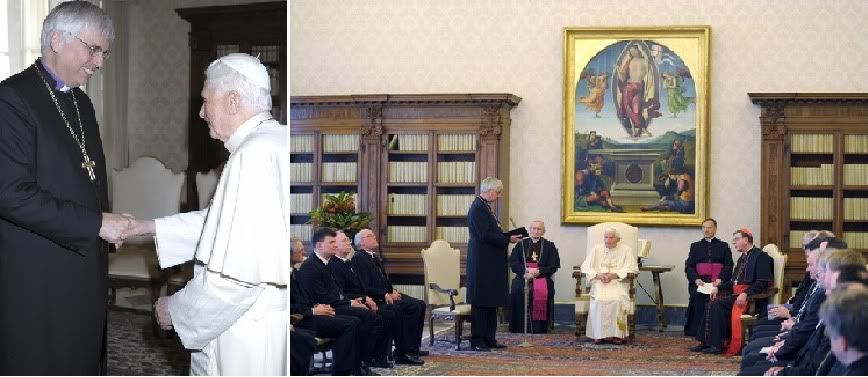 The Pope welcomes Bishop Johannes Friedrich, head of the Lutheran delegation from Germany, who delivered a greeting in behalf of his delegation.
The Pope welcomes Bishop Johannes Friedrich, head of the Lutheran delegation from Germany, who delivered a greeting in behalf of his delegation.
VATICAN CITY, JAN. 24, 2011 (Zenit.org).- Benedict XVI says that what has already been achieved between Catholics and Lutherans on the path to unity reinforces trust that the dialogue will continue.
The Pope said this today when he received in audience a delegation of the Evangelical Lutheran Church of Germany, in Rome for the end of the Week of Prayer for Christian Unity. The week of prayer ends Tuesday with the feast of the Conversion of St. Paul.
"Despite the theological differences that continue to exist on questions that in part are fundamental, a 'togetherness' has grown between us, which becomes increasingly the basis of a communion lived in faith and in spirituality between Lutherans and Catholics," he said. "What has already been achieved reinforces our trust in continuing the dialogue, because only in this way can we stay together on that way that, finally, is Jesus Christ himself."
The Holy Father admitted he shares the concern of many Christians that "the fruits of the ecumenical endeavor, above all in relation to the idea of Church and ministry, are still not sufficiently received by the ecumenical interlocutors."
"For some contemporaries," he said, "the common goal of full and visible unity of Christians seems to be again today very far. The ecumenical interlocutors in the dialogue have ideas on the unity of the Church that are completely different."
"However," the Pontiff affirmed, "even if new difficulties always arise, we look with hope to the future." The Holy Spirit will guide us, he assured.
Benedict XVI affirmed that for both Lutherans and Catholics, ecumenical dialogue is now an integral part of the reality and life of faith.
He mentioned the 500th anniversary of the posting of Martin Luther's theses, which will be marked in 2017.
"On that occasion, Lutherans and Catholics will have the opportunity to celebrate throughout the world a common ecumenical commemoration, to fight at the world level for fundamental questions, not -- as you yourself have just said -- under the form of a triumphant celebration, but as a common profession of our faith in the One and Triune God, in the common obedience to Our Lord and to his Word," the Pope said.
In this context, he encouraged common prayer "for forgiveness of mutual wrongs and for the fault related to the divisions."
"Part of this purification of the conscience," the Pontiff suggested, is a common review of the 1,500 years that preceded the Protestant Reformation, the years "which are common to us."
"For this," he said, "we wish to implore together, in a constant way, the help of God and the assistance of the Holy Spirit, to be able to take further steps toward the unity that we long for, and to not be satisfied with where we are now."
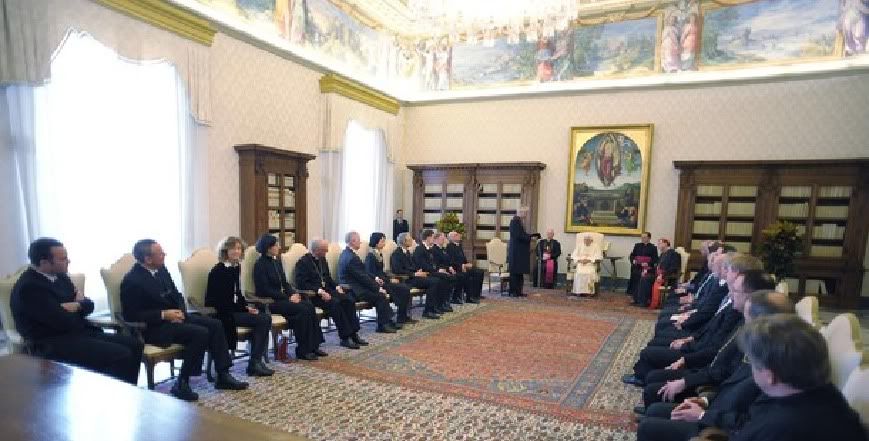
Later, Vatican Radio spoke to Bishop Friedrish who said this:
It was a very cordial meeting, I know the Pope for many years.....I thanked him for what he has done for the common Declaration of Justification and I asked for 2 or 3 things....for Eucharistic hospitality for Lutheran members of a mixed marriage. This is possible (under) the law, but in Germany the bishops decided not to do it yet, and I asked him to support our request from the German bishops.
The second thing which was important for me was that we will have a Jubilee in 2017, 500 years since the beginning of the Reformation, and we don't want to celebrate this year as Lutherans alone, but together with the Roman Catholic Church....because also the Roman Catholic Church was also reformed by the Reformation, and I hope they will give us a critical, consultative report about what Martin Luther has done for the Roman Catholic Church.
100 years ago, the Jubilee was marked with a big stone monument, a very national German monument. This time we'll do it in a very international, very ecumenical way, so we have a so-called 'Luther Garden' where we'll plant 500 trees, so we'll have a growing monument. 500 churches will each plant a tree in Wittenburg and they shall plant another tree in their home country. This was done here - Cardinal Kasper planted one in Wittenburg and now his successor, Cardinal Koch, planted one in St Paul's (Outside the Walls).
[Modificato da TERESA BENEDETTA 26/01/2011 01:32] |
| |
 25/01/2011 09:22 25/01/2011 09:22 |
|
| | | OFFLINE | | Post: 22.004
Post: 4.632 | Registrato il: 28/08/2005
Registrato il: 20/01/2009 | Administratore | Utente Master | |
|

LITURGICAL CELEBRATIONS WITH THE HOLY FATHER
FEBRUARY TO APRIL 2011
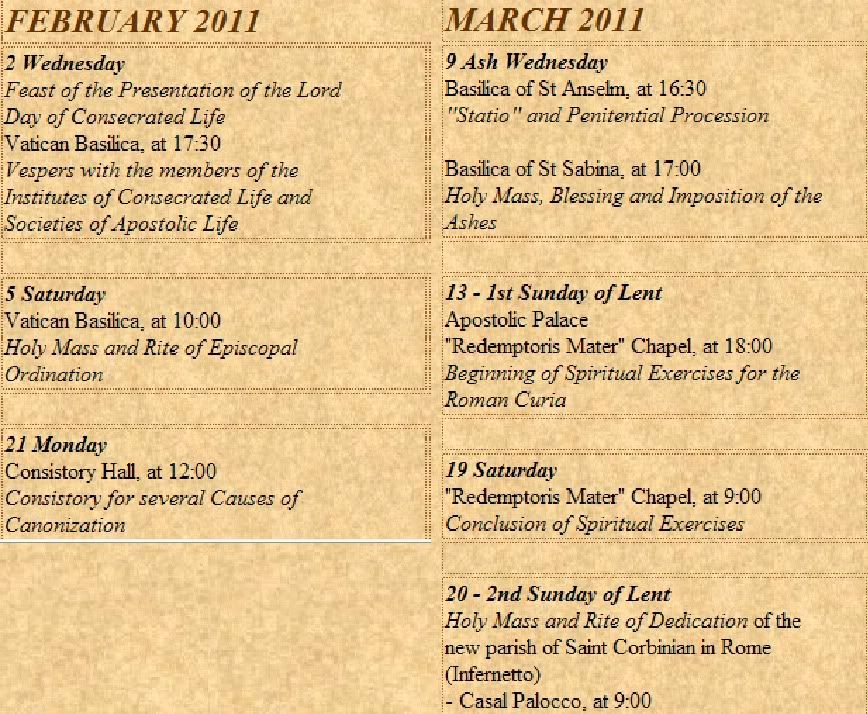
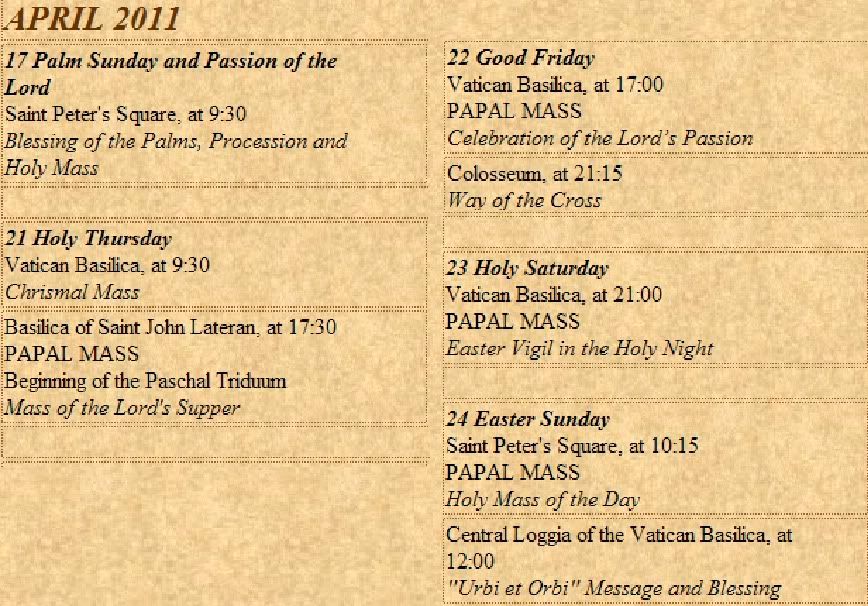 NB: On April 16, Benedict XVI turns 84.
NB: On April 16, Benedict XVI turns 84.
April 19 is the sixth anniversary of his election as Pope.
On May 1, he will beatify the Venerable John Paul II.
[Modificato da TERESA BENEDETTA 25/01/2011 16:02] |
| |
 25/01/2011 10:35 25/01/2011 10:35 |
|
| | | OFFLINE | | Post: 22.005
Post: 4.633 | Registrato il: 28/08/2005
Registrato il: 20/01/2009 | Administratore | Utente Master | |
|
 The website cites ZENIT as its news source, but I don't see the item posted on ZENIT...
Al-Azhar imam will
The website cites ZENIT as its news source, but I don't see the item posted on ZENIT...
Al-Azhar imam will
also boycott Assisi

January 24, 2011
An Egyptian daily has reported that the Grand Imam of Al-Azhar, Ahmed al-Tayyeb ,will not be attending the Assisi inter-religious meeting convoked by Benedict XVI for October. The Pope announced Jan. 1 that he would personally participate in the Assisi gathering, which marks the 25th anniversary of the first inter-religious prayer for peace event held there by Pope John Paul II.
"These meetings, ultimately, are not bringing any good to Muslims, and they don't do good to the East but only to the West," declared al-Tayyeb. "And in all the conferences in which we took part in the past, we said clearly that the West is not serious in its way of approaching the nature of Islamic civilization and the civilization of the Middle East and of Easterners."
"We hold ourselves to our relationship with the Vatican, but we also have the right not to be in agreement with the Vatican," he added, "and we hope that Benedict XVI, as a religious who appeals for peace, will address a word to Muslims apologizing for the Crusades and acknowledging the richness that the Islamic civilization has contributed to European civilization." [Now, he's using 'dialog' as an opportunity for his sort of moral blackmail!!]
Meanwhile, Father Rafiq Greich, director of the press office of the Catholic Coptic Church in Egypt, told Arabia.net that the Al-Azhar decision was "surprising."
He said the Catholic Church in Egypt has clarified more than once the truth about the Pope's words, and that last week, together with the Orthodox Patriarch, representatives had taken the Pope's text in English with an Arabic translation to Mahmoud Zaqzouq, minister of religious affairs.
Father Greich said the meeting "shed light on Al-Jazeera's attempt to create problems between the Catholic Church and Egypt, and especially with Al-Azhar." Al-Jazeera is a news network.
"The Pope did not refer at all to the internal affairs of the Middle East, limiting himself to say: I ask the governments to protect the Christians and citizens of the Middle East. Al-Jazeera interpreted this passage as if the Pope had requested other governments to protect Christians, whereas he addressed his request to the local governments," the priest explained.
Father Greich added that a delegation, of which he was a part, headed by Auxiliary Bishop Kamal Fahim Awad (Boutros) Hanna of Alexandria, an aid to Cardinal Antonios Naguib, Patriarch of Alexandria of the Copts, went to visit al-Tayyeb last Sunday, and that "the truth of the Pope's interventions" had been clarified.
The sheikh of Al-Azhar invited the Vatican "to pay more attention in its interventions," but added that he was willing to issue a communiqué to explain what emerged during the meeting.
However, said Father Greich, "the communiqué never happened, and we were surprised when reading the communiqué of the Islamic Research Council manifesting the desire to interrupt dialogue with the Vatican, whereas we are convinced that everything can be resolved with dialogue."
"We are sorry that this is the position of the Islamic Research Council, especially because we see in its members prudence and wisdom, and we hope that dialogue will be taken up again as soon as possible at the local and Vatican level, especially because Catholics are an essential part of Egyptian society," he added.
P.S. It turns out that the source for the above is a lenghty article in AsiaNews, not ZENIT:
Al-Azhar also expected in Assisi
by Fr. Bernardo Cervellera
Editor

ROME, Jan. 25 (AsiaNews) - The decision of Al Azhar to "freeze" dialogue with the Vatican continues to surprise and pain Egyptian Christians. The spokesman of the Coptic Catholic Church, Fr. Rafic Greich, has expressed regret over the Islamic University’s decision and his hopes that dialogue will resume.
Vatican officials, above all, hope that Al Azhar will not miss the meeting with representatives of world religions in Assisi in October, convokved by Benedict XVI to remember the 25 years since the first meeting called by John Paul II and revive the "spirit of Assisi". [Benedict XVI did not say or imply this latter phrase in his January 1 announcement.]
Unfortunately, Al Azhar and the Egyptian government continue to criticize the Pope's words who – they maintain - asked the Western governments to come to the defense of Christians oin his New Year’s message.
In addition, they accuse the Pope of only being concerned for Christians and of not taking to heart "the violence faced by Muslims in Iraq and Afghanistan".
In fact, what the Pontiff said in his homily on New Year's Day was this [which made no specific reference to the Alexandria bombings since this incident took place around the time the Pope was saying Mass:
In the face of the threatening tensions today, in the face above all of discriminations, tyrannies and religious intolerance, which today particularly strike at Christians, I reiterate once more my urgent appeal not to succumb to discouragement and resignation.
I call on everyone to pray so that the efforts undertaken by many to promote and build peace in the world may come to a happy end. For this difficult mission, words alone will not suffice - it requires the concrete and constant commitment of responsible national authorities[This is the closest thing he came to calling on national authorities in general to safeguard religious freedom and the rights of minorities], but above all, it is necessary that every person be animated by the authentic spirit of peace, that must be implored ever anew in prayer and that must be lived in our daily relationships, in every field.
*
The satellite channel al-Jazeera, and many Western media short- circuited the Pope's words in their headlines, summarizing them as "The Pope calls on Western governments to defend the Christians in the Middle East" - implying, in short, a new kind of crusade.
[One must note what else the Pope said in those days that related to anti-Christian acts. There was, of course, his message for the World Day of peace on January 1, a text released one month earlier, in which his only specific reference to anti-Christian violence was the All Souls' Day massacre of Christians in a Baghdad church. The entire message was, of course, on Rel;igious freedom, a path to peace', in which, he wrote, among other things:
Finally I wish to say a word to the Christian communities suffering from persecution, discrimination, violence and intolerance, particularly in Asia, in Africa, in the Middle East and especially in the Holy Land, a place chosen and blessed by God.
I assure them once more of my paternal affection and prayers, and I ask all those in authority to act promptly to end every injustice against the Christians living in those lands.
And then, at the Angelus on January 2, this was what he said explicitly about the Alexandria bombing:
Yesterday morning, we learned with sorrow about the grave attack against the Coptic Christian community of Alexandria in Egypt. This vile act of death - like that of placing bombs near the homes of Christians in Iraq to force them to leave - is an offense to God and all mankind, which only yesterday had prayed for peace as we started a new year with hope.
In the face of this strategy of violence targeting Christians, with consequences to the entire population, I pray for the victims and their families, and I encourage the ecclesial communities to persevere in the faith and in bearing witness to non-violence as the Gospel teaches.
Only people who never actually read the Pope's texts - or those who deliberately misrepresent his words - could find any iota of 'interference' in national affairs in these texts.]
It must be said that throughout the past few weeks and several times, Cardinal Antonios Naguib, head of the Assembly of Catholic Patriarchs and Bishops of Egypt, publically explained what the pope actually said.
A Catholic delegation, headed by Greek Melkite Patriarch Gregorios III, visited Mahmoud Hamdi Zaqzouq, Minister of Waqfs (Islamic Religious Affairs), to hand him the Arabic translation of Benedict XVI’s address and clarify the ambiguity caused by al Jazeera that "attempts to sow confusion and stir relations between Egypt and in particular, Al Azhar, and the Catholic Church."
According to Fr. Greich, Al Jazeera deliberately turned the papal declaration into a "request for Western governments to protect Christians," while the Pope only asked local governments to protect all citizens from terrorism.
A week ago, another Catholic delegation - including the auxiliary bishops of Alexandria, Mgr. Youhanna Golte and Mgr Boutros Fahim, along with Fr Greich - visited the Imam of Al Azhar, Sheikh Ahmad Al Tayyib, to present him with the actual statements of the Pope and point out Al Jazeera’s manipulation thereof.
At the end of the encounter Al-Tayyib agreed that Al Azhar would publish a statement on their meeting.
"Instead of such a press statement", said Father Greich, "we were shocked by the announcement of the freezing of dialogue between Al Azhar and the Vatican”.
The growing feeling among experts is that the freezing of the dialogue between the Vatican and Al Azhar is a smokescreen to conceal Egypt’s responsibility for the Alexandria attack.
From the very start the Egyptian government denounced "foreign hands" behind the massacre of Christians, stressing that "Christians and Muslims in Egypt are one nation." [The Egyptian government has since laid the blame for the Alexandria attack on Al-Qaeda.]
This declaration of innocence is not totally true. In fact, the Christians in Egypt face discrimination on many levels (construction of churches, repairs, employment in public positions, etc.). Moreover, the government has one nothing to stop the growth of fundamentalism and fanaticism, which are the bedrock of terrorism.
From this point of view, in the aftermath of the attack in Alexandria, the Catholic Church has made a series of requests to the government (new laws on religious buildings; restructuring of the school curricula to erase discrimination, fair trials and the imposition of sentences for those who encourage fanaticism,..).
Instead, the government continues to favour the track of foreign terrorists, and is slow to address the problems of discrimination within its own borders.
To a certain extent, Egypt is behaving like many Western governments. These, too, after the bombings in Baghdad and Alexandria, cried terrorism, failing to realise that the crux of the problem of Christians safety lies with governments which prefer to sacrifice the followers of Jesus rather than risk unhinging the Muslim world. Thus they do not help religious freedom, but on the contrary, the leave the door open for fanaticism.
On the other hand, Western governments should not be invoked to launch wars and sanctions, but to strengthen cultural dialogue, to support education (an area that is becoming increasingly controlled by al Qaeda), to suggest effective reciprocity. [But no one, least of all the Church, has asked Western governments 'to launch wars and sanctions'! These governments know exactly what pressures they can apply to get results when they really want to, But so far, only the Italian government has publicly and diplomatically called on foreign governments to protect the rights of Christians. The United States has not officially said anything about this issue, not even after the Baghdad massacre in November, to say nothing of all the Christian killings in Mosul over the past few years.]
Under the shadow of this shameful situation of political inanity, both Eastern and Western, the real value of the meeting in Assisi and its "spirit" becomes increasingly relevant.
As in the days of John Paul II, in no way does it want to be seen as a sort of "UN of religions", a watered-down syncretism of identities. Rather, the global meeting aims to be a symbol.
Its "spirit" wants to emphasize two elements: that religion and religions are not a problem for the world, but a resource. That they can live together and are not destined towards an inevitable clash of civilizations.
In this sense, the Assisi proposal aims, as a positive gesture, to counter the problems which undermine global peace as identified by the Pope; terrorism and secularism. The first because it uses violence to impose one religion, the other because it marginalizes the religious energies of society, reduces freedom of religion, and humiliates the dignity of all persons to the material dimension alone.
Forgive the digression, but I have the strong impression that Benedict XVI does not willingly use the phrase 'spirit of Assisi'. He did not use the term when he announced his October 2011 initiative on January 1. In the letter he wrote to the Franciscans in Assisi in 2006 to mark the 20th anniversary of Assisi-I, he only used the term once, as follows:
In order not to misinterpret the meaning of what John Paul II wanted to achieve in 1986 and what, to use his own words, he habitually called the "spirit of Assisi", is important not to forget the attention paid on that occasion to ensuring that the interreligious Prayer Meeting did not lend itself to syncretist interpretations founded on a relativistic concept. www.vatican.va/holy_father/benedict_xvi/letters/2006/documents/hf_ben-xvi_let_20060902_xx-incontro-assisi...
When he made a pastoral visit to Assisi in 2007, he gave seven discourses (to the poor Clares, a homily, an Angelus message, to Bavarian nuns in Assisi, to the Franciscan community, to diocesan priests, religious and seminarians, and to young people), at which he only used the term once, in the homily:
The "spirit of Assisi", which has continued to spread throughout the world since that event, counters the spirit of violence and the abuse of religion as a pretext for violence. Assisi tells us[/DIM}[Not 'the spirit of Assisi tells us'] that faithfulness to one's own religious conviction, and especially faithfulness to the Crucified and Risen Christ, is not expressed in violence and intolerance but in sincere respect for the other, in dialogue, in a proclamation that appeals to freedom and reason and in the commitment to peace and reconciliation.
www.vatican.va/holy_father/benedict_xvi/homilies/2007/documents/hf_ben-xvi_hom_20070617_assisi...
Indeed, his discourses in Assisi were remarkable for being a distinct effort to 'restore' the real Francis of Assisi, not as the the original 'flower child' and 'peacenik' built up in modern myths like the 'spirit of Assisi', but as a young libertine who converted to Christ - i.e., repented of his earlier heedless life - to become a true and loyal man of the Church (even if he was not a priest) and an imitation of Christ.... I've also checked the address the Holy Father made to the Franciscan family in Castel Gandolfo in April 2009, on the occasion of the eighth centenary of the birth of Francis - not once does he mention the phrase 'spirit of Assisi'!
[Modificato da TERESA BENEDETTA 25/01/2011 18:25] |
| |
 25/01/2011 15:57 25/01/2011 15:57 |
|
| | | OFFLINE | | Post: 22.006
Post: 4.634 | Registrato il: 28/08/2005
Registrato il: 20/01/2009 | Administratore | Utente Master | |
|

 Tuesday, January 25, Third Week in Ordinary Time
Tuesday, January 25, Third Week in Ordinary Time
 FEAST OF THE CONVERSION OF ST. PAUL
FEAST OF THE CONVERSION OF ST. PAUL
"On one such occasion I was traveling to Damascus with the authorization and commission of the chief priests. At midday, along the way, O king, I saw a light from the sky, brighter than the sun, shining around me and my traveling companions. We all fell to the ground and I heard a voice saying to me in Hebrew, 'Saul, Saul, why are you persecuting me? It is hard for you to kick against the goad". and I said, 'Who are you, sir?' And the Lord replied, 'I am Jesus whom you are persecuting. Get up now, and stand on your feet. I have appeared to you for this purpose, to appoint you as a servant and witness of what you have seen (of me) and what you will be shown. I shall deliver you from this people and from the Gentiles to whom I send you, to open their eyes that they may turn from darkness to light and from the power of Satan to God, so that they may obtain forgiveness of sins and an inheritance among those who have been consecrated by faith in me." (Acts 25,12-21)
Readings for today's Mass:
www.usccb.org/nab/readings/012511.shtml
OR for 1/24-1/25/11:
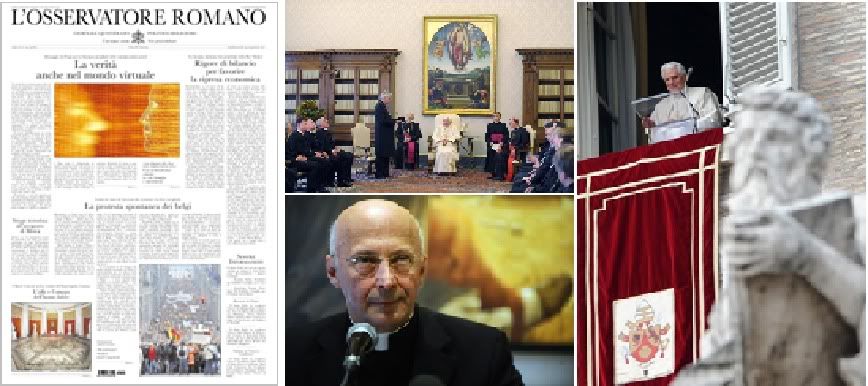
The Holy Father's message for this year's World Day for Social Communications:
'Truth even in the virtual world'
Other papal stories in this issue: The Pope's meeting with a delgEation from the German Lutheran Church who are in Rome for the Week of Prayer for Christian Unity; and his Angelus message on Sunday in which he said 'Every division in the Church is an offense to Christ'. In the inside pages, the OR publishes the full text of Cardinal Angelo Bagnasco's opening address yesterday to the winter meeting of the Italian bishops' Permanent Council, in which he indirectly addressed the media furor over Prime Minister Berlusconi's reported dalliance with an underage teenager. Page 1 news: The terrorist bomb attack in Moscow's main domestic airport that killed at least 35 and wounded dozens of others; the European central bank urges EU members that fiscal discipline is essential for economic recovery; Belgians take to the streets to protest inability of ruling parties to form a government 220 days after the last cabinet resigned; and the Vatican Museums merit two volumes in the latest edition of the Italian Encyclopedia.
PAPAL EVENTS TODAY
VESPERS TO CONCLUDE
PRAYER WEEK FOR CHRISTIAN UNITY
Tuesday, Jan. 25
17:30 Basilica of St. Paul outside the Walls
Second Vespers
Solemnity of the Conversion of St. Paul
POPE'S CONDOLENCES FOR
MOSCOW AIRPORT BOMB VICTIMS
Translated from

The Vatican today released the text of a telegram sent by Cardinal Tarcisio Bertone in behalf of the Holy Father to President Medvedev of Russia, ofering his condolences for the tragic terrorist bomb attack in Moscow's Domededovo airport yesterday. Here is a translation from the original Italian:
TO HIS EXCELLENCY
HON. DMITRIJ ANATOLEVICH MEDVEDEV
PRESIDENT OF THE RUSSIAN FEDERATION
HAVING LEARNED THE TRAGIC NEWS OF THE ATTACK IN MOSCOW'S DOMEDEDOVO AIRPORT, IN WHICH MANY PERSONS LOST THEIR LIVEE, HIS HOLINESS BENEDICT XVI EXPRESSES HIS PROFOUND SORROW AND FIRM RENUNCIATION OF THE GRAVE ACT OF VIOLENCE, AND WISHES TO EXTEND HIS SPIRITUAL CLOSENESS AND SINCERE CONDOLENCE TO THE FAMILIES OF THE VICTIMS.
THE SUPREME PONTIFF ASSURES HIS FERVENT PRAYERS FOR THE SOULS OF THE DEPARTED, AND AS HE INVOKES THE LORD FOR HEAVENLY COMFORT TO THOSE WHO MOURN THEIR LOSS, HE ALSO SENDS HIS BLESSINGS AND HIS THOUGHTS FOR THOSE WHO WERE INJURED.
I TOO JOIN IN THE SORROW OF THE RUSSIAN FEDERATION AND EXTEND MY MOST SINCERE OBSEQUIES.
CARDINAL TARCISIO BERTONE
SECRETARY OF STATE TO HIS HOLINESS
[Modificato da TERESA BENEDETTA 25/01/2011 16:05] |
| |
 25/01/2011 21:07 25/01/2011 21:07 |
|
| | | OFFLINE | | Post: 22.007
Post: 4.635 | Registrato il: 28/08/2005
Registrato il: 20/01/2009 | Administratore | Utente Master | |
|

 SECOND VESPERS:
SECOND VESPERS:
Feast of the Conversion of St. Paul
Conclusion of the Week of Prayer for Christian Unity
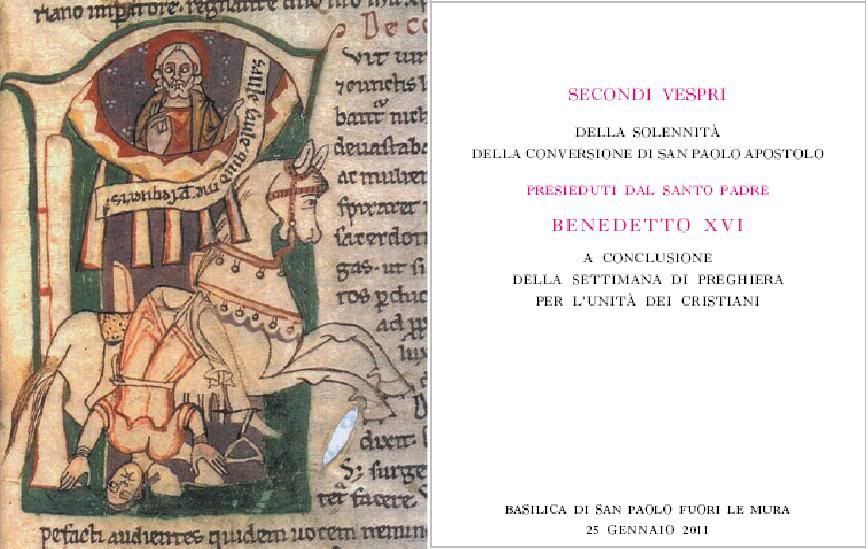
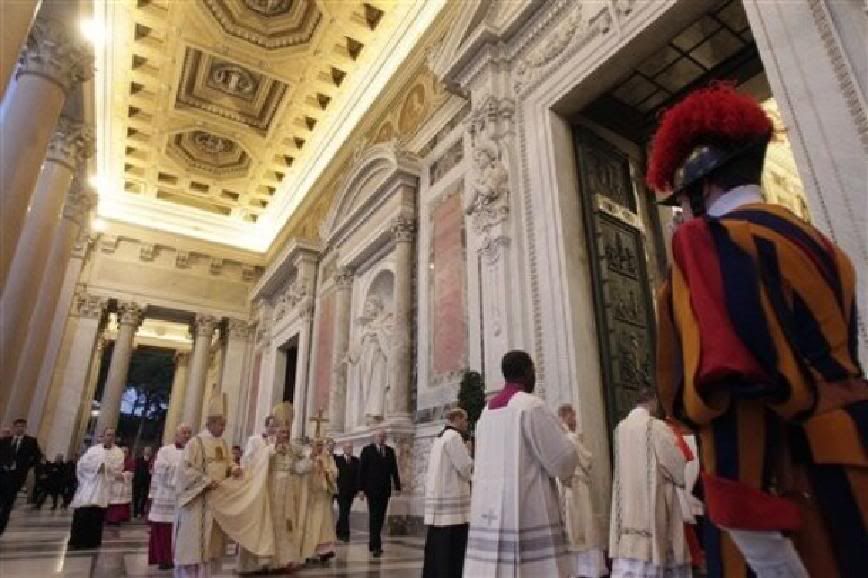
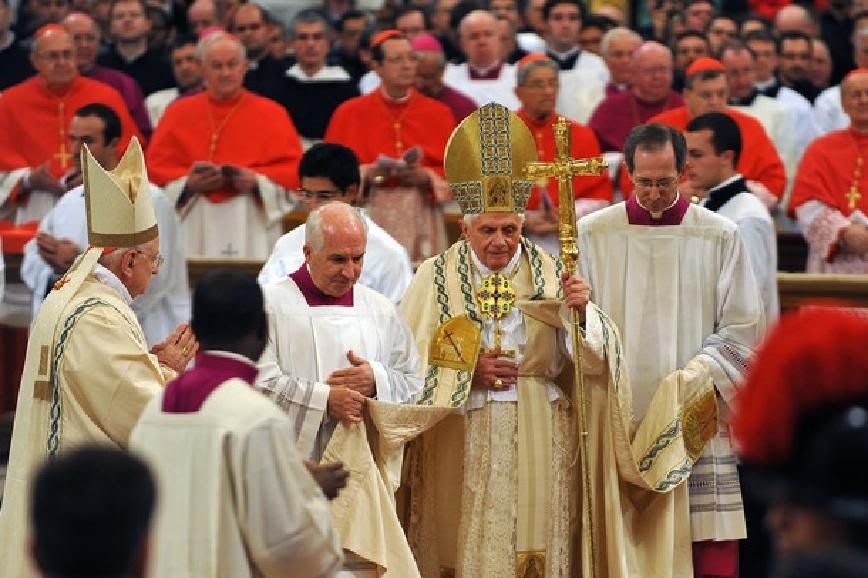
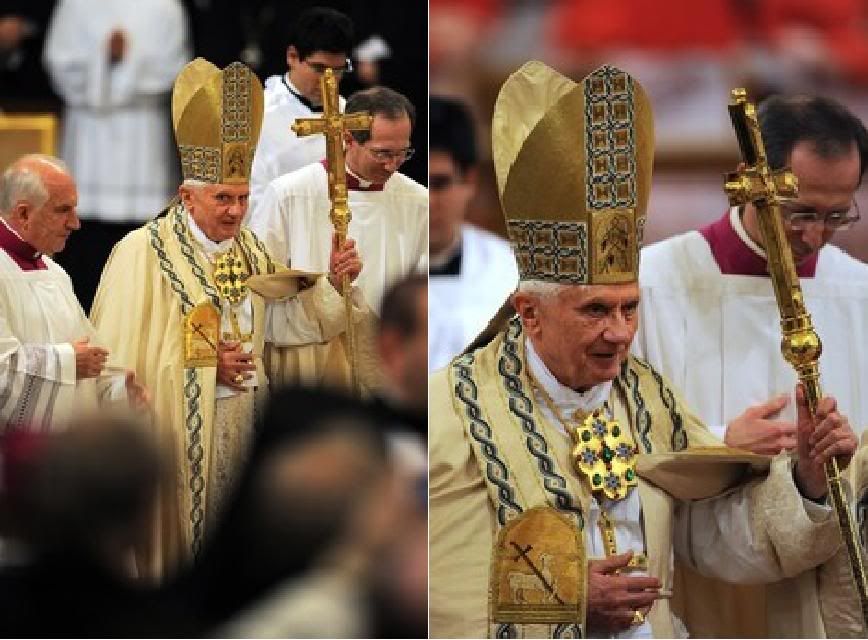
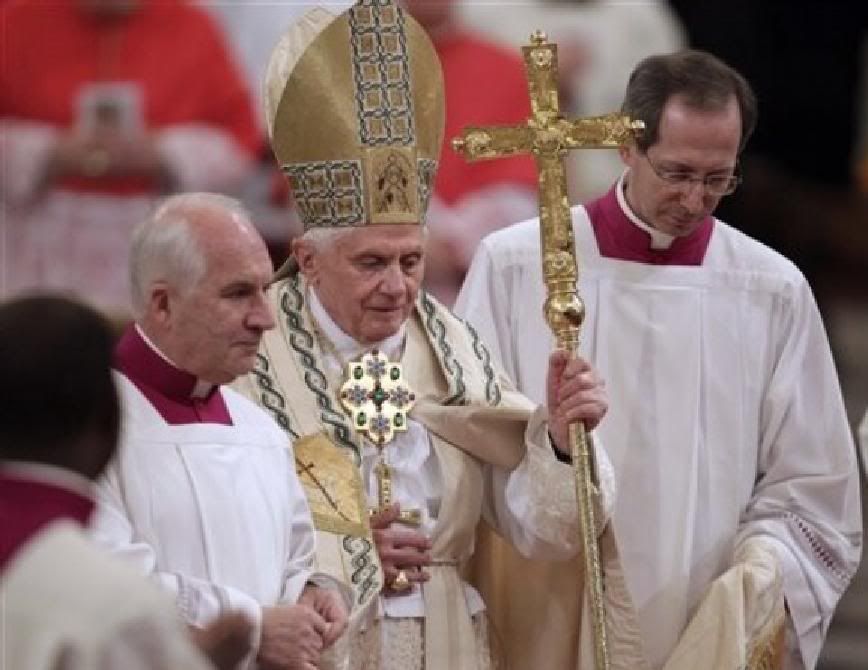
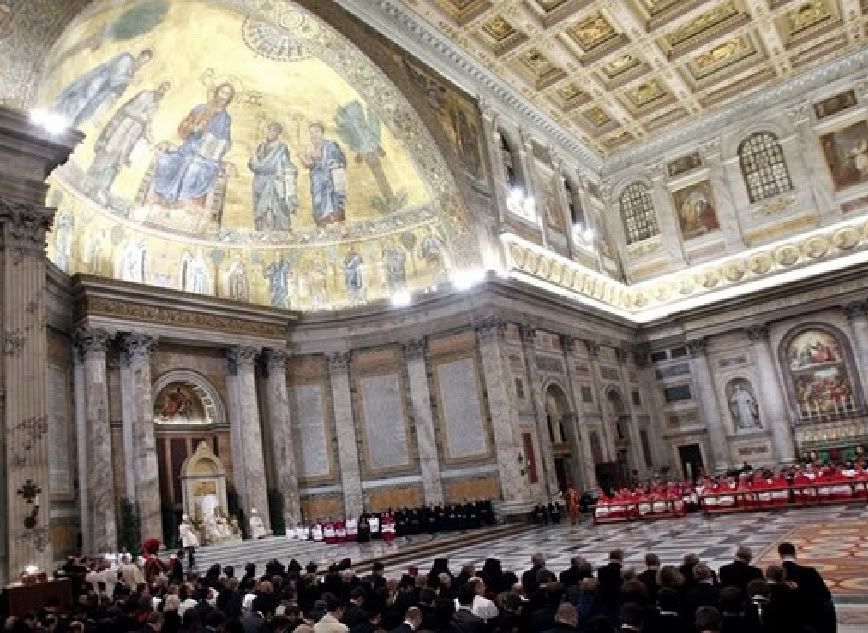 Search for Christian unity
Search for Christian unity
is 'moral imperative,' Pope says
By Cindy Wooden

ROME,Jan. 25 (CNS) -- Giving in to the temptation of thinking the Christian churches will never be fully united is a sign of weak faith, Pope Benedict XVI said today,
"One must resist the temptation of resignation and pessimism, which is a lack of trust in the power of the Holy Spirit," the Pope said Jan. 25 at an ecumenical evening prayer service marking the close of the Week of Prayer for Christian Unity.
The Pope presided over the service at Rome's Basilica of St. Paul Outside the Walls with a German Lutheran delegation, an international group of Oriental Orthodox bishops and theologians, and Orthodox, Anglican and Protestant leaders from Rome.
Special prayers were read by Orthodox Metropolitan Gennadios of Italy and Malta, and by the Rev. David Richardson,director of theAnglican Center of Rome, who represented the Anglican archbishop of Canterbury.
In his homily, the Pope said the search for Christian unity is "a moral imperative, a response to a precise call of the Lord."
The theme of the 2011 week of prayer, "One in the apostles' teaching, fellowship, breaking of bread and prayer," described the unity experienced within the early Christian community, the Pope said.
The early Christian community in Jerusalem "was not closed in on itself, but from its birth it was catholic, universal, capable of embracing people of different languages and cultures," the Pope said.
"It was a community not founded on a pact among its members, or on the simple sharing of a project or ideal, but on profound communion with God," he said.
Pope Benedict repeated what he had said Jan. 19 during his weekly general audience at the Vatican: The theme's four ingredients are the four pillars of Christian faith and are "the fundamental dimensions of unity of the visible body of the church."
To be fully united, he said, Christians must hold firm to the faith taught by the apostles, they must gather together, they must share the Eucharist, and they must pray constantly.
Because unity must be based on faith believed and lived in common, he said at the prayer service, Christian unity cannot be reduced to a recognition and acceptance of differences and an agreement to coexist peacefully.
"That for which we yearn is the unity for which Christ himself prayed and which, by its nature, is manifested in a communion of faith, sacraments and ministry," Pope Benedict said.
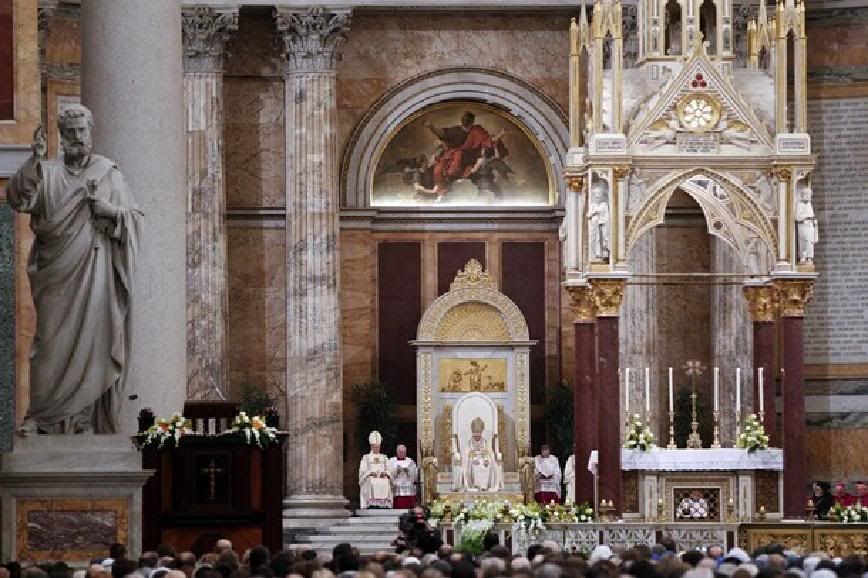
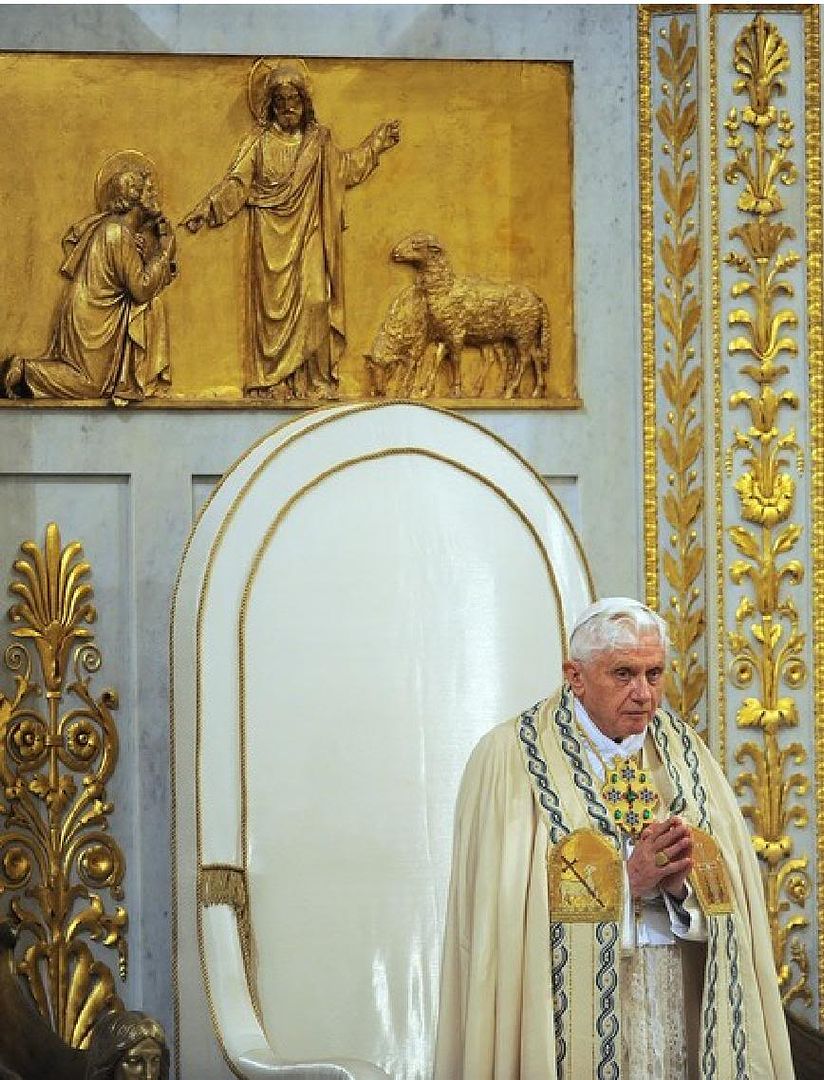
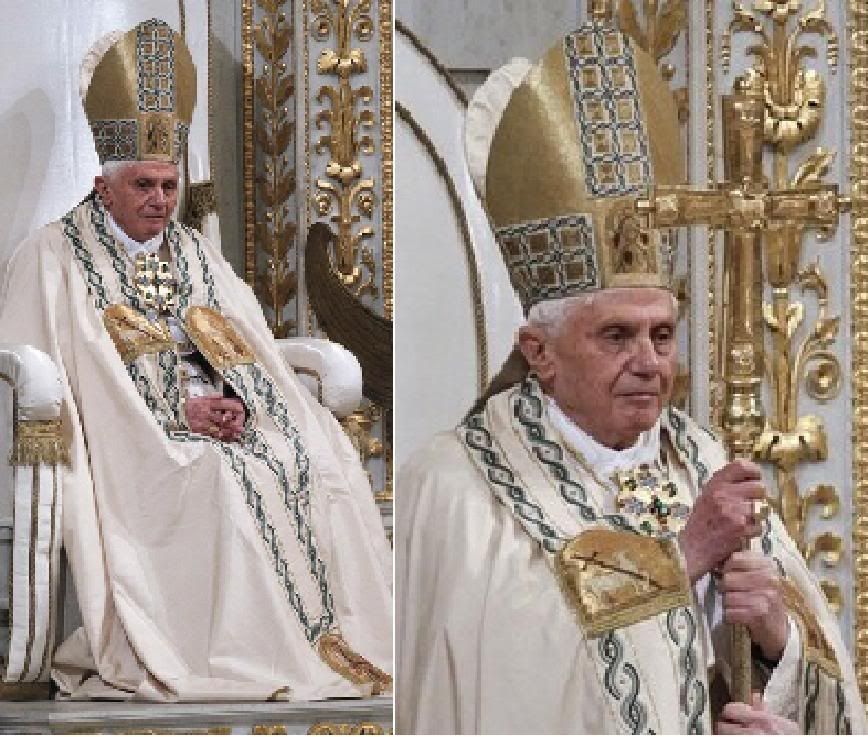
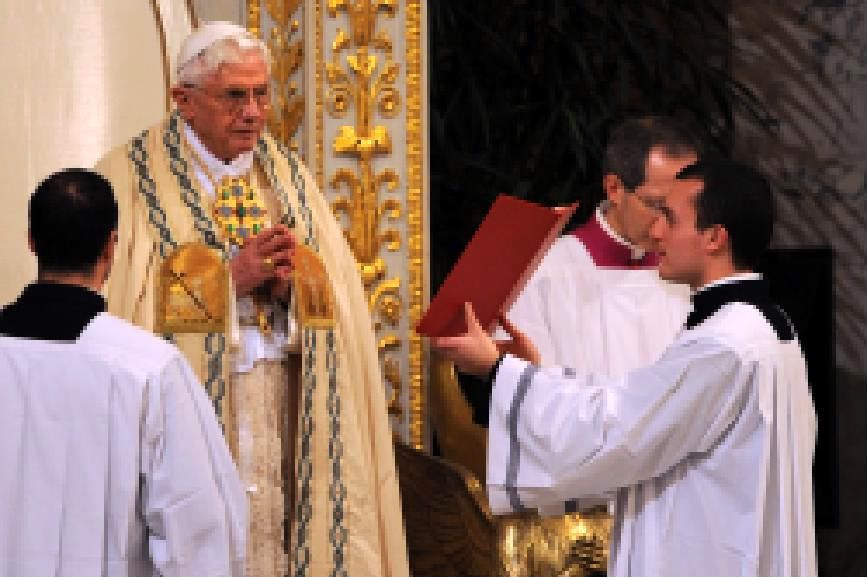 Here is a translation of the Holy Father;s homily:
Here is a translation of the Holy Father;s homily:
Dear brothers and sisters:
Following the example of Jesus, who on the eve of his Passion prayed to the Lord for his disciples, "so that all may be one" (Jn 17,21), Christians continue incessantly to invoke God for the gift of unity.
This requesr becomes more intense during the Week of Prayer which ends today, when the Churches and ecclesial communities meditate and pray together for the unity of all Christians.
This year, the theme offered for our meditation was proposed by the Christian communities of Jerusalem, to whom I wish to express my sincere gratitude, with assurances of my affection and prayers, both on my part and of the Church.
The Christians of the Holy City invite us to renew and strengthen our commitment for the re-establishment of full unity, meditating on the model of living shown by the first disciples of Christ gathered in Jerusalem: "They devoted themselves to the teaching of the apostles and to the communal life, to the breaking of bread, and to prayers" (Acts 2, 42).
This is the picture of the first community born in Jerusalem on the day of Pentecost, inspired by the preaching of the Apostle Peter, filled with the Holy Spirit, and open to all those who had come to the Holy City for the holiday.
A community that was not closed in itself but, from its very birth, was catholic, universal, capable of embracing people of different languages and cultures, as the book of the Acts of the Apostles tells us.
A community that was not founded on a pact among its members, nor out of simple sharing of a plan or an ideal, but on profound communion with God, who had revealed himself in his Son - from the encounter with Christ who had died and was resurrected.
In a brief summary, which concludes the chapter that begins with the narration of the descent of the Holy Spirit on the day of Pentecost, the evangelist Luke presents syhthetically the life of this first community:
Those who listened to the word preached by Peter and were baptized, listened to the Word of God transmitted by the Apostles. They stayed together gladly, taking charge of necessary services and sharing their material goods freely and generously.
They celebrated the sacrifice of Christ on the Cross, the mystery of his death and resurrection, in the Eucharist, repeating the gesture of breaking bread. They praised and thanked the Lord continually, invoking his help in difficulties.
But this description is not simply a recollection of the past nor the presentation of an example to imitate or of an ideal goal to reach. It is above all an affirmation of the presence and action of the Holy Spirit in the life of the Church. It is an attestation, full of trust, that the Holy Spirit, uniting everyone in Christ, is the principle of unity of the Church and makes of all believers one thing only.
The teachings of the Apostles, their fraternal communion, the breaking of bread and prayer, are the concrete forms of life of the first Christian community of Jerusalem, united by the action of the Holy Spirit, but at the same time, these constitute the essential traits of all Christian communities, of every time and every place.
In other words, we can say that they represent the fundamental dimensions of unity in the visible Body of the Church.
We should acknowledge that in the last few decades, the ecumenical movement, "emerging by impulse of the grace of the Holy Spirit" (Unitatis redintegratio, 1), has made significant steps forward which have made possible encouraging convergences and consensus on various points, which has led to relationships of esteem and reciprocal respect among the Churches and ecclesial communities, as well as of concrete collaboration in confronting the challenges of today's world.
But we also know very wellt hat we are still far from that unity which Christ prayed for and which we find reflected in the picture of the first Christian community of Jerusalem.
The unity to which Christ, through the Spirit, calls the Church is not to be realized only on the level of organizational structures, but shall be configured at a more profound level, as unity expressed "in the confession of one single faith, in the common celebration of divine worship, and in the fraternal concord of the family of God" (ibid., 2).
The search for teh re-establishment of unity among divided Christians can therefore not be reduced to a recognition of reciprocal differences and to achieving peaceful coexistence. What we yearn for is the unity that Christ himself prayed for and which, by its nature, is manifested as a communion of faith, of the sacraments, of ministry.
The journey towards this unity must be seen as a moral imperative, responding to a precise call by the Lord. For this, we must overcome the temptation of resignation and pessimism, which is a lack of confidence in the power of the Holy Spirit.
Our duty is to continue along this road to our goal with passion, with serious and rigorous dialog to look into our common theological, liturgical and spiritual patrimony; with reciprocal knowledge; with the ecumenical formation of the new generations; and above all, through the conversion of the heart and with prayer.
In fact, as the Second Vatican Council declared, "The holy purpose of reconciling all Christians in the unity of the one and only Church of Christ, goes beyond human powers and gifts" and therefore, our hope must be placed first of all "in Christ's prayer for the Church, the love of the Father for us, and in the power of the Holy Spirit (ibid.,24).
In this quest for full visible unity among all Christians, we are acocmpanied and sustained by the Apostle Paul, whose conversion we celebrate solemnly today. He - before the Risen Lord appeared to him on the road to Damascus, saying "I am Jesus whom you persecuted" (Acts 9,5)] - had been one of the most persistent adversaries of the first Christian communities.
The evangelist Luke describes Saul as among those who had approved the killing of Stephen in the days when violent persecution erupted against the Christians of Jerusalem (cfr Acts 9,1). From the Holy City, Saul left to extend the persecution of Christians to Syria, and after his conversion, he would return to Jerusalem to be introduced to the Apostles by Barnabas, who guaranteed the authenticity of Paul's encounter with the Lord.
From then on, Paul was admitted not only as a member of the Church but as a preacher of the Gospel along with the Apostles, having received, like them, the manifestation of the Risen Lord and his special call to be 'the chosen instrument' to bring his name to all peoples (cfr Acts 9,15).
In his long missionary journeys, Paul, travelling through different cities and regions, never forgot his bond of communion with the Church of Jerusalem. Collecting money for the Christians of that community who soon needed to be helped (cfr 1Cor16,1), occupied an important part of Paul's concerns, who considered it not just an act of charity, but also the sign and guarantee of the unity and communion among the churches he set up and that primitive community in the Holy City - a sign of unity in the only Church of Christ.
In this atmosphere of intense prayer, I wish to extend my cordial greeting to everyone present: to Cardinal Crancesco Monterisi, arch-priest of this Basilica; to Cardinal Kurt Koch, president of the Pontifical Council for Promoting Christian Unity; to the other cardinals; my brothers in the episcopate and priesthood; the abbot and the Benedictine monks of this ancient community; the religious and lay people who represent the enture diocesan community of Rome.
I especially greet the brothers and sisters from the other Churches and ecclesial communities who are represented here this evening. Among them, it is a particular pleasure to greet the members of the Mixed International Commission for Theological Dialog between the Catholic Church and the Eastern Orthodox Churches, who are meeting in Rome these days.
We entrust to the Lord the success of your meeting, so that it may represent another step forward towards that unity we all wish for.
In German, he said:
I wish to extend a special greeting to the representatives of the United Evangelical Lutheeran Churches of Germany who are in Rome under the leadership of the Bavarian bishops.
He concluded in Italian:
Dear brothers and sisters, trusting in the intercession of the Virgin Mary, Mother of the Church, let us therefore invoke the gift of unity. Toether with Mary, who on the day of the Pentecost was in the Cenacle with the Apostles, let us address God, the source of every good, so that he may renew for us today the miracle of Pentecost, in order that, guided by the Holy Spirit, all Christians may re-establish their full unity in Christ. Amen.
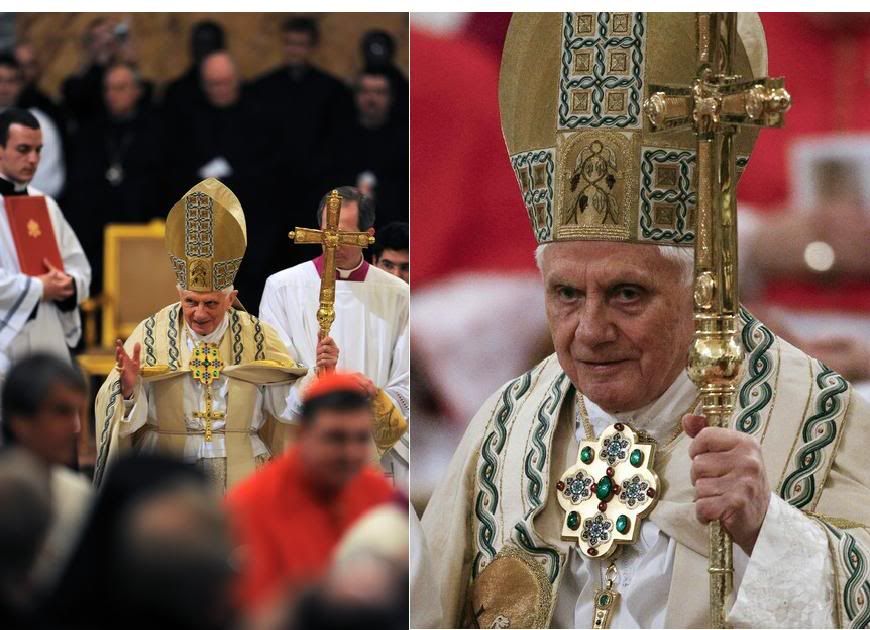
[Modificato da TERESA BENEDETTA 26/01/2011 17:42] |
| |
 26/01/2011 01:09 26/01/2011 01:09 |
|
| | | OFFLINE | | Post: 22.008
Post: 4.636 | Registrato il: 28/08/2005
Registrato il: 20/01/2009 | Administratore | Utente Master | |
|

 Gospel must not be
Gospel must not be
an elite message, Pope says

VATICAN CITY, Jan, 25, 2011 (CNA/EWTN News).- Pope Benedict said in a message on missionary efforts that the Gospel is not an “exclusive” message to an elite few but rather a gift to be shared and “a piece of good news to be passed on.”
On Jan. 25, the Vatican released the Pope's official statement for the 85th annual World Mission Sunday traditionally observed on the third Sunday of October (Oct. 23 this year).
The event is organized by the Congregation for the Evangelization of Peoples. through its worldwide Societies for the Propagation of the Faith and Pontifical Missionary Societies, as an occasion for Catholics to recommit themselves to the Church's missionary activity through prayer.
The theme of this year's celebration is, “As the Father has sent me, so I send you.”
Pope Benedict opensessage by emphasizing that the “announcement of the Gospel is destined for everyone.”
“The Church exists to evangelize,” he said. “Her activity, in conformity with the word of Christ and under the influence of His grace and charity, becomes fully and truly present in all individuals and all peoples in order to lead them to faith in Christ.”
The task of spreading the Gospel, then, “has lost none of its urgency,” the Pope said. The Church cannot “rest easy” at the thought that “there are people who still do not know Christ, who have not yet heard His message of salvation.”
Pope Benedict also addressed the growing number of individuals who have heard the Gospel but have forgotten it, abandoned it, or no longer identify themselves with the Church. He said that in modern times, even traditionally Christian societies are “reluctant to open themselves to the word of faith.”
He cited a cultural shift – influenced by globalization and increasing relativism – as leading to mentalities and lifestyles “that ignore the Evangelical message as if God did not exist, and which exalt the search for well-being, easy earnings, career and success as the goals of life, even at the expense of moral values.”
To those who hear and believe, the Pope said, the Gospel “is not the exclusive prerogative of those who received it, but a gift to be shared, a piece of good news to be passed on.”
“This gift-commitment is entrusted not just to the few, but to all baptized people,” he underscored.
Pope Benedict noted that the mission of evangelization entrusted to the Church is a complex process that includes “various elements.”
He said that missionary activity must “maintain solidarity and sustain the institutions necessary to establish and consolidate the Church,” as well as contribute to improving the living conditions of people in countries most affected by problems of poverty, malnutrition, disease, and lack of health care and education services.
“Ignoring the temporal problems of humanity,” he said, “would not be in keeping with Jesus's own behavior, who 'went about all the cities and villages, teaching in their synagogues, and proclaiming the good news of the kingdom, and curing every disease and every sickness.'”
“Thus, by responsible participation in the mission of Christ, Christians become builders of the peace and solidarity that Christ gives us, and they collaborate in achieving God's plan of salvation for all humankind,” Pope Benedict said.

MESSAGE OF THE HOLY FATHER BENEDICT XVI
FOR WORLD MISSION SUNDAY
October 23, 2011
“As the Father has sent me, so I send you.” (Jn 20:21)
On the occasion of the Jubilee of the year 2000 Venerable John Paul II, at the beginning of a new millennium of the Christian era, forcefully confirmed the necessity of renewing the commitment to bring the Gospel proclamation to all with “the enthusiasm of the very first Christians” (Apostolic Letter Novo Millennio Ineunte, 58).
It is the most precious service that the Church can render to humanity and to every individual seeking profound reasons for living his or her existence to the full. Therefore that same invitation re-echoes every year in the celebration of World Mission Day.
In fact the ceaseless proclamation of the Gospel also revitalises the Church, her fervour, her apostolic spirit; it renews her pastoral methods so that they may be ever more suited to new situations – also those that require a new evangelization – and animated by missionary thrust:
“Missionary activity renews the Church, revitalizes faith and Christian identity, and offers fresh enthusiasm and new incentive. Faith is strengthened when it is given to others! It is in commitment to the Church's universal mission that the new evangelization of Christian peoples will find inspiration and support” (John Paul II, Enc. Redemptoris Missio, 2).
This objective is constantly renewed by the celebration of the liturgy, particularly by the celebration of the Eucharist, which always ends by reiterating the risen Jesus’ command to the Apostles: “Go…” (Mt 28:19).
The Liturgy is always a call ‘from the world’ and a new sending ‘into the world’ to bear witness to what one has experienced: the salvific power of the Word of God, the salvific power of Christ’s Paschal Mystery.
All those who have met the risen Lord have felt the need to proclaim him to others, as did the two disciples on the road to Emmaus. After recognising the Lord in the breaking of bread, they “set out that instant and returned to Jerusalem. There they found the Eleven assembled” and told them what had happened to them on the road (Lk 24:33-34).
Pope John Paul II exhorted us to be “watchful, ready to recognize his face and run to our brothers and sisters with the good news: 'We have seen the Lord!'” (Ap. Letter, Novo Millennio Ineunte, 59).
The beneficiaries of the Gospel proclamation are all peoples. The Church “is missionary by her very nature, since it is from the mission of the Son and the mission of the Holy Spirit that she draws her origin, in accordance with the decree of God the Father” (Vatican Council II, Decr. Ad Gentes, 2).
This is “the grace and vocation proper to the Church, her deepest identity. She exists in order to evangelize” (Psul VI, Ap. Ex. Evangelii Nuntiandi, 14).
Consequently, she can never withdraw into herself. She is rooted in particular places in order to go beyond them. Her action, in obedience to Christ’s command and under the influence of his grace and his love, becomes fully and truly present to all men and women and to all peoples in order to lead them to faith in Christ (cf. Ad Gentes, 5).
This task has not lost any of its urgency. Indeed, “the mission of Christ the Redeemer, which is entrusted to the Church, is still very far from completion…. An overall view of the human race shows that this mission is still only beginning and that we must commit ourselves wholeheartedly to its service” (John Paul II, Enc. Redemptoris Missio, 1).
We cannot be content when we consider that, after two thousand years, there are still peoples who do not know Christ and have not yet heard his Message of salvation.
Not only this: but there is an ever greater number of people who, although having received the proclamation of the Gospel, have forgotten it or abandoned it and no longer associate with the Church; and many sectors, even in traditionally Christian societies are today reluctant to open to the word of faith.
Cultures are changing, nourished also by globalisation, by movements of thought and by the prevailing relativism, a change that leads to a mentality and a life-style that disregard the Gospel message, as if God did not exist, and that exalt the search for well-being, easy money, a career and success as the aim of life, even to the detriment of moral values.
The universal mission involves everyone, everything and always. The Gospel is not an exclusive possession of those who have received it, but it is a gift to be shared, good news to be passed on to others. And this gift-commitment is entrusted not only to some, but to all the baptised, who are “a chosen race … a holy nation, God’s own people” (1 Pt 2:9), in order that they may proclaim his marvellous works.
All activities are also involved in this. The Church’s attention and cooperation in missionary activity in the world cannot be limited to some particular moments or occasions, nor can they be considered as one of many pastoral activities: the Church’s missionary dimension is essential; therefore it must always be kept in mind.
It is important that both individual baptised persons and ecclesial communities should be involved not only spasmodically and occasionally in mission, but constantly, as a way of Christian life.
Mission Day is not an isolated moment in the year, but a precious occasion for pausing to reflect on whether and how we respond to the missionary vocation: an essential response for the life of the Church.
Evangelization is a complex process and includes various elements. Among these, in missionary animation, particular attention has always been given to solidarity. This is also one of the objectives of World Mission Day, which, through the Pontifical Mission Societies, appeals for help to carry out evangelizing activities in mission territories.
It involves supporting institutions necessary for establishing and consolidating the Church through catechists, seminaries, priests; and also giving one’s own contribution to improve the living conditions of people in nations where poverty, malnutrition, above all infantile malnutrition, diseases, lack of health care services and education are most serious. This, too, is part of the Church’s mission.
Proclaiming the Gospel she takes human life to heart in the fullest sense. It is unacceptable, the Servant of God Paul VI declared, that in evangelization the themes of human promotion, justice, liberation from every form of oppression, obviously with respect for the autonomy of the political sphere, should be neglected.
To ignore the temporal problems of humanity would be “to forget the lesson which comes to us from the Gospel concerning love of our neighbour who is suffering and in need” (Ap. Exhortation Evangelii Nuntiandi, 31.34); it would be inconsistent with the behaviour of Jesus, who “went about all the cities and villages, teaching in their synagogues, and proclaiming the good news of the Kingdom, and curing every disease and every sickness” (Mt 9:35).
Therefore through co-responsible participation in the Church’s mission, the Christian becomes a builder of communion, of peace and of the solidarity that Christ has given us, and he or she collaborates in fulfilling God’s plan of salvation for all humanity.
The challenges it meets call Christians to journey together with others, and mission is an integral part of this journey with all. In it, albeit in clay pots, we bring our Christian vocation, the priceless treasure of the Gospel, the living witness to Jesus dead and risen, met and believed in in the Church.
May World Mission Day reawaken in each person the joy and desire to “go” out to meet humanity taking Christ to all. In his name I wholeheartedly impart my Apostolic Blessing, especially on those who toil and suffer most for the Gospel.
From the Vatican
6 January 2011
On the Solemnity of the Epiphany of the Lord

[Modificato da TERESA BENEDETTA 30/01/2011 00:09] |
| |
 26/01/2011 14:00 26/01/2011 14:00 |
|
| | | OFFLINE | | Post: 22.010
Post: 4.638 | Registrato il: 28/08/2005
Registrato il: 20/01/2009 | Administratore | Utente Master | |
|
 Wednesday, January 26, Third Week in Ordinary Time
Wednesday, January 26, Third Week in Ordinary Time
 SAINTS TIMOTHY AND TITUS (1st century AD), Disciples of St. Paul, Bishops
SAINTS TIMOTHY AND TITUS (1st century AD), Disciples of St. Paul, Bishops
Timothy and Titus are both mentioned by St. Paul several times in his letters, especially Timothy, and in fact, two letters to Timothy
and one to Titus are part of the New Testament. Pope Benedict XVI dedicated his catechesis on December 13, 2006, to them, following
his catecheses on the Twelve Apostles and Paul himself. Both were Greek-born (Though Timothy's mother was Jewish), met up with Paul
during his missionary travels, and travelled with him or were sent on missions by him. Paul's affection and confidence in his two
disciples are evident in his letters. Indeed, Timothy went on to be Bishop of Ephesus, and Titus, Bishop of Crete. Legend says that
St. John first came to stay with Timothy in Ephesus before he was exiled to Patmos. The Orthodox Church also venerates Timothy as
a martyr, because it is said he was stoned to death (around 80 AD) by pagans who protested a Christian procession led by him. Titus
apparently lived peacefully to age 95 (around 107 AD).
Readings for today's Mass:
www.usccb.org/nab/readings/012611.shtml
OR today.
The only papal stories in this issue are the Holy Father's message for World Mission Day regarding the urgency of evangelization in a globalized world, for the annual observance celebrated this year on October 23 (third Sunday in October); and a reflection on his address to the Roman Rota last Monday about Catholic matrimony. The issue went to press before the Vespers that ended the Week of Christian Unity. International news on Page 1: Russia falls back under the incubus of terrorism from Muslim secessionist extremists; a worrisome drought in China has now affected the area around Beijing itself; a UN report says 1.6 billion people around the world have no access to electricity. Two articles in the inside pages reflect on Cint Eastwood's movie about the afterlife, Hereafter.
PAPAL EVENTS TODAY
General Audience - The Holy Father resumed his catechetical cycle on great medieval women in the Church
with France's Joan of Arc (1412-1431).
Security 'disturbance' by
2 Maltese at today's GA

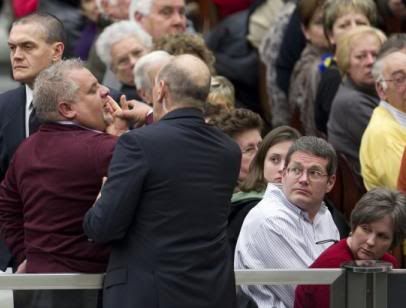 Caruana stopped by Vatican security (Photo from La Repubblica).
Caruana stopped by Vatican security (Photo from La Repubblica).
ROME, January 26 - Self-styled religious mystic and another faithful stopped by Vatican security from delivering letter to Pope Benedict XVI.
The Italian press agency ANSA reports that two Maltese nationals were involved in a security breach at the Vatican, when they climbed over a security barrier at the Paul VI hall during Pope Benedict's General Audience today.
One of the persons was Angelik Caruana, who claims to deliver messages from the Holy Virgin in what have been uninterrupted visitations since 2006, when he claimed a statue of the Virgin in his house was weeping tears of blood.
Pope Benedict XVI was hosting a general audience at the time, when the two Maltese, according to ANSA - started shouting out loud to attract attention to them, saying they wished to deliver a letter to the Pope.
Vatican press deputy director Fr Ciro Benedettini said the letter was taken by the Vatican gendarmerie, and contained "devotional messages".
Our sister newspaper Illum claims there is a Curial document of teh Malta Archdiocese proving that the blood found on the statue of the Holy Virgin in Caruana's home, was human blood, allegedly that Caruana himself.
In a message Caruana claims to have received last August, 4, the Virgin Mary was said to have promised a spring that would provide water that will heal the sick.
[What's with some Franciscans who seem very ready to believe tales of the supernatural? Franciscans were and are behind the entire Medjugorje phenomenon (and continue to defy the Church and the diocese), and now a sidebar from the Times of Lata identifies yet another Franciscan as a leading follower of Caruana who is now spreading stories about a new 'crying' image of Mary...]
 - For about two days, the story about 'Pope says marriage is not an automatic right' dominated the online summaries of Anglophone MSM headlines around the world, but were soon replaced by the 'Pope blesses social networking' pap to which the MSM have reduced the Pope's message on the right uses of the new information technologies - still in the news two days since the message was released. Not unexpectedly, only the Catholic media are reporting on his messages regarding Christian unity...
- For about two days, the story about 'Pope says marriage is not an automatic right' dominated the online summaries of Anglophone MSM headlines around the world, but were soon replaced by the 'Pope blesses social networking' pap to which the MSM have reduced the Pope's message on the right uses of the new information technologies - still in the news two days since the message was released. Not unexpectedly, only the Catholic media are reporting on his messages regarding Christian unity...
[Modificato da TERESA BENEDETTA 26/01/2011 17:00] |
| |
 26/01/2011 15:03 26/01/2011 15:03 |
|
| | | OFFLINE | | Post: 22.011
Post: 4.639 | Registrato il: 28/08/2005
Registrato il: 20/01/2009 | Administratore | Utente Master | |
|
 The Holy Father's recent address to the Tribunal of the Roman Rota the Church's appellate court for matters of canon law, dealing primarily with petitions for marriage annulment, was addressed to the prelate-magistrates in their language - i.e., where each term has a precise legal meaning not necessarily equivalent to our routine understanding of the term. Nonetheless, there could be no mistaking what he meant to any layman reading the address carefully. (It wasn't easy to translate because I had to weigh every word to make sure I was not mistaking the sense of the words.)
The Holy Father's recent address to the Tribunal of the Roman Rota the Church's appellate court for matters of canon law, dealing primarily with petitions for marriage annulment, was addressed to the prelate-magistrates in their language - i.e., where each term has a precise legal meaning not necessarily equivalent to our routine understanding of the term. Nonetheless, there could be no mistaking what he meant to any layman reading the address carefully. (It wasn't easy to translate because I had to weigh every word to make sure I was not mistaking the sense of the words.)
It was perhaps understandable that most MSM accounts of it - based on excerpts quoted by Vatican sources from the address, and not on the whole address - amounted to simplistic reductions with the corollary distortion andor incomprehension that usually comes with such reductions. However, the headline 'Catholics do not have an automatic right to marriage' is not a bad approximation of what the Holy Father said, in teh sense that priests hould not perform a marriage just because the two persons involved want to get married - they must be adequately prepared for what Catholic marriage means.
For the members of the Rota, the message was that they should be discriminating about determining a valid cause for marriage annulment, and for pastors, that they should not be cavalier about the pre-marriage preparation of couples. On his blog, Fr. Finigan seeks a straightforward acocunt in common terms....
What did the Pope really
say about marriage?
by Fr. Tim Finigan
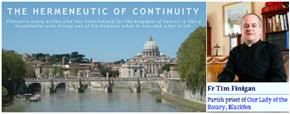
January 24, 2011
Did the Pope really say that couples do not have the right to marry? Well no: as with much of his writing, it was a carefully crafted argument; this time on some aspects of the right to marry which the Catholic Church has always upheld. Reading through the address, I thought it might be helpful just to make a few points about what the Pope actually said and the reasoning that he was using.
First of all, Pope Benedict points out that canon law is not opposed to the pastoral dimension of the Church. This is fundamental since "canonical" has often been portrayed as bad while "pastoral" is good. In fact the law protects us all and without it our society would be in chaos and nobody would be safe.
In the case of marriage, juridical activity is essential to pastoral preparation because the legal contract is at the heart of the celebration of marriage.
The Holy Father's principal concern is with marriage preparation. He complains that in preparation for marriage, canonical questions occupy a modest, if not insignificant place. He is arguing that the canonical questions are vital since there is "only one marriage" not two marriages, one pastoral and the other canonical.
The "authentic conjugal dynamic of life and love" is rooted in the juridical bond between husband and wife thanks to the vows they take which have legal force. In other words, marriage is about living out the binding promises that are made at the wedding.
Hence, Pope Benedict says, this is where we find the "right to marriage": it is not a subjective thing that pastors must formally recognise independently of what the spouses actually intend. The right to marry refers to the right to celebrate a real marriage, not a union that is juridically invalid because of some defect.
It is this area on which the Pope focusses when he speaks of preparation for marriage. He is not talking about a "Mr and Mrs Show" in which the couple are asked "What are the five things you most like about him/her?" but the task of ascertaining that the couple have the right convictions regarding the obligations required for the celebration of a valid marriage. The validity is not irrelevant to their having a happy marriage but is necessary for it.
The Holy Father says that the immediate objective of marriage preparation is to promote the celebration of an authentic marriage. He explains that this means the constituting of a bond which has the characteristics of unity (one man, one wife) and indissolubility, and which is ordained to the good of the spouses and the procreation and upbringing of children.
Thus, he explains, the Church does not refuse the celebration of marriage to those who have the right intention to wed according to what marriage really is, even if they are not perfectly prepared spiritually.
He underlines the importance of the "pre-marriage examination" - in England we call this the "pre-nuptial enquiry" - where each of the partners (interviewed separately) is asked to affirm seriously that they understand the basic characteristics of marriage, and that they enter it freely.
Pope Benedict is particularly concerned to end the "vicious circle" in which there is no serious attempt to ascertain that the couple understand and accept the necessary requirements for Christian marriage, and then a nullity is granted when the marriage breaks down. He also cautions against taking simple failures on the part of the spouses as a cause for nullity.
The Holy Father ends by emphasising once again the relationship between law and pastoral care:
In concluding these reflections of mine, I turn to consider the relationship between law and pastoral care. It is often the object of misunderstandings, to the detriment of law, but also to the detriment of pastoral work. On the contrary, it is necessary to promote in all sectors, and in a special way in that of marriage and the family, profound harmony between the pastoral and the juridical, which will certainly show itself to be fruitful for those who approach marriage.
It is not always an easy argument to follow, especially since we live in a culture where everything is "my right" regardless of obligations and the objective character of what we claim a right to. Hence my attempt to summarise some of the more important points.
In the Church, the Pope's address may well be misused to subject couples to endless marriage preparation sessions exploring "relationship" and "compatibility". What the Holy Father is actually insisting on is closer attention to the canonical requirements for valid and authentic marriage.
[Modificato da TERESA BENEDETTA 26/01/2011 17:15] |
| |
 26/01/2011 17:23 26/01/2011 17:23 |
|
| | | OFFLINE | | Post: 22.012
Post: 4.640 | Registrato il: 28/08/2005
Registrato il: 20/01/2009 | Administratore | Utente Master | |
|
 GENERAL AUDIENCE TODAY
GENERAL AUDIENCE TODAY
Catechesis on St. Joan of Arc
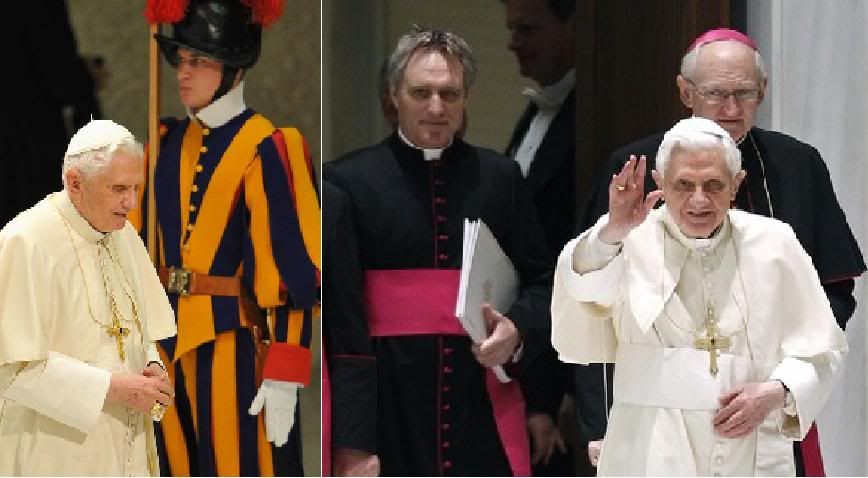
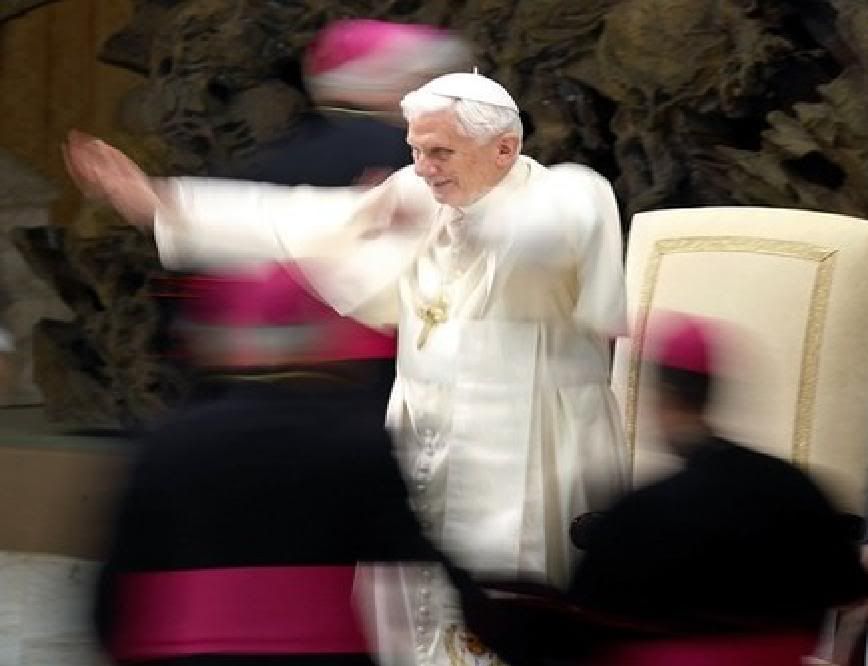
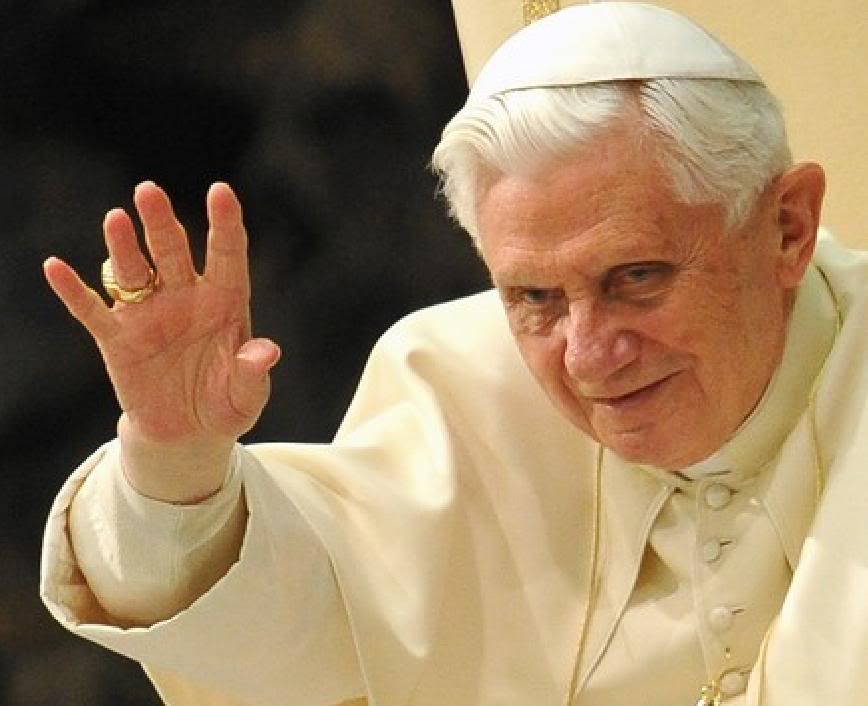
 Joan of Arc can serve as example
Joan of Arc can serve as example
of service for politicians today,
Pope says at General Audience

26 JAN 2011 (RV) - St. Joan of Arc is "a beautiful example of holiness for lay people involved in politics”, especially in “the most difficult situations", Pope Benedict XVI said today, continuing his series of lessons on the great women in the Church of the Middle Ages.
The Holy Father dedicated his Wednesday audience to the French saint burnt at the stake in 1430, at the young age of 18.
Benedict described her as “one of those strong women who brought the light of the Gospel in history to the end of the Middle Ages", whose luminous witness invites us to a high standard of Christian life: making prayer the mainstay of our days, following the will of God whatever it may be, living love without favouritisms and without limits".
He also said her trial “is a shocking page in the history of the Saints and also an illuminating page on the mystery of the Church ,which, in the words of Vatican II, is at once holy and always in need of purification. It was a dramatic encounter between this Saint and her judges, who were clergymen. Joan was accused by them and found guilty to be condemned as a heretic and sent to a terrible death by burning".
He says her judges were "theologians who lacked the charity and humility to see the action of God in this young woman" and who bring to mind the words of Jesus, "the mysteries of God are revealed to those who have the hearts of children, while remaining hidden from the learned and wise".
Thus, Joan’s judges "were fundamentally unable to understand her, to see the beauty of her soul: they did not know they were condemning a Saint”. However, he concluded , her unjust condemnation was overturned twenty-five years later.
Here is how he sythesized the catechesis in English:
Our catechesis today deals with Saint Joan of Arc, one of the outstanding women of the later Middle Ages. Raised in a religious family, Joan enjoyed mystical experiences from an early age.
At a time of crisis in the Church and of war in her native France, she felt God’s call to a life of prayer and virginity, and to personal engagement in the liberation of her compatriots.
At the age of seventeen, Joan began her mission among the French military forces; she sought to negotiate a just Christian peace between the English and French, took an active part in the siege of Orleans and witnessed the coronation of Charles VII at Rheims.
Captured by her enemies the next year, she was tried by an ecclesiastical court and burnt at the stake as a heretic; she died invoking the name of Jesus. Her unjust condemnation was overturned twenty-five years later.
At the heart of Saint Joan’s spirituality was an unfailing love for Christ and, in Christ, for the Church and for her neighbour. May the prayers and example of Saint Joan of Arc inspire many lay men and women to devote themselves to public life in the service of God’s Kingdom, and encourage all of us to live to the fullest our lofty calling in Christ.
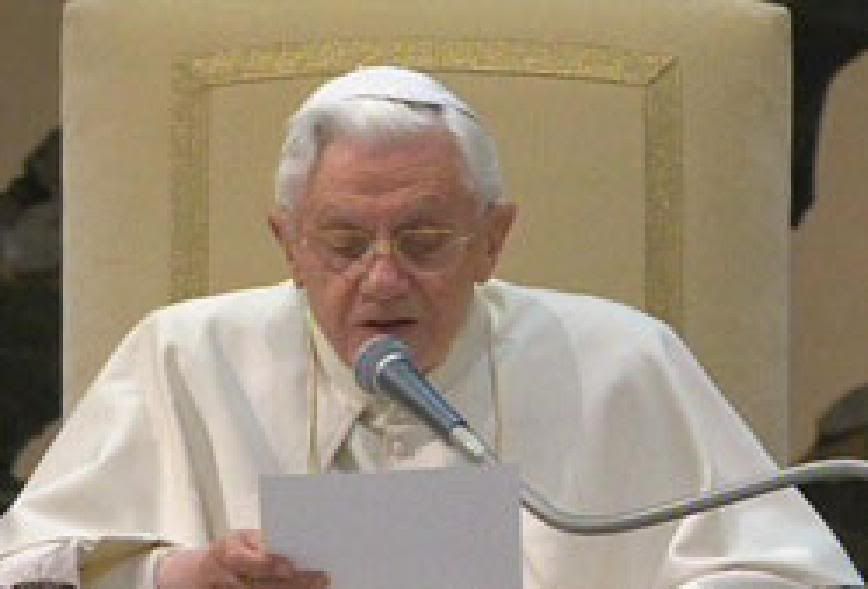 Here is a translation of the full catechesis. (I have chosen to use the French form of Joan of Arc, being her 'original' name. I notice that in his synthesis in German today, the Holy Father used 'Jeanne d'Arc', not a Germanization of it):
Here is a translation of the full catechesis. (I have chosen to use the French form of Joan of Arc, being her 'original' name. I notice that in his synthesis in German today, the Holy Father used 'Jeanne d'Arc', not a Germanization of it):
 Dear brothers and sisters,
Dear brothers and sisters,
Today I wish to speak to you of Jeanne d'Arc (Joan of Arc), a young saint from the end of the Middle Ages, who died in 1431 at the age of 19. This French saint, who is cited many times in the Catechism of the Catholic Church lived shortly after St. Caterina of Siena, patron of Italy, about whom I spoke in a recent catechesis.
They were, in fact, both young women of the people, laywomen and consecrated virgins, two mystics who were involved not behind cloisters but in the midst of the most dramatic events of the Church and the world in their time.
Perhaps they were the most characteristic figures of those 'strong women' who, at the end of the Middle Ages, brought the great light of the Gospel into the complex events of history.
We can place them alongside the holy women who remained on Calvary, close to the crucified Jesus and his mother Mary, while the Apostles had fled and Peter himself had denied him three times.
The Church in their time was going through the profound crisis of the Great Western Schism, which lasted almost 40 years. When Catherine of Siena died in 1380, there was a Pope and an anti-Pope. When Jeanne was born in 1412, there was a Pope and two anti-Popes.
Along with this laceration within the Church, there were continuing fratricidal wars among the Christian nations of Europe, the most tragic of which was the interminable Hundred Years' War between France and England.
Jeanne d'Arc could not read or write, but we are able to know her to the depth of her spirit, thanks to two sources of exceptional historical value: the proceedings of the two trials she underwent.
The first, the Process of Condemnation (PCon), contains the transcripts of the many lengthy interrogations of Jeanne during the last months of her life (February to May 1431), reporting the words of the saint herself.
The second, the Process of Nullification of the Condemnation (or 'Rehabilitation') (PNul), contains the depositions of some 120 eyewitnesses to all the stages of her life. (cfr Procès de Condamnation de Jeanne d'Arc, 3 vol. e Procès en Nullité de la Condamnation de Jeanne d'Arc, 5 vol., ed. Klincksieck, Paris l960-1989).
Jeanne was born in Domremy, a small village on the border between France and Lorraine. Her parents were well-off peasants, known to everyone as excellent Christians. From them she received a good religious education, influenced notably by the spirituality of the Holy Name of Jesus, as taught by St. Bernardino of Siena and spread throughout Europe by the Franciscans.
The name of Jesus was always coupled with the name of Mary, and thus, with a background of popular religiosity, Jeanne's spirituality was both profoundly Christocentric as well as Marian. From childhood on, she showed great charity and compassion for the poor, the sick, and all who suffered in the tragic context of war.
From her own words, we learn that Jeanne's religious life matured with mystic experiences since she was 13 (PCon, I, p. 47-48). Through the 'voice' of the Archangel Michael, Jeanne felt she was called by the Lord to intensify her life as a Christian and to involve herself in person for the liberation of her people.
Her immediate response, her 'Yes', was her vow of virginity, with a new commitment to sacramental life and prayer: daily Mass, frequent Confession and Communion, long periods of silent prayer before the Crucifix or the image of the Madonna.
The young peasant girl's compassion and involvement in the face of her people's suffering were made more intense by her mystical relationship with God. One of the most original aspects of this young woman's holiness was precisely this link between mystical experience and political mission. After years of a hidden life and interior maturation came the brief but intense two years of her public life: a year of action and a year of Passion.
At the start of the year 1429, Jeanne began her work of liberation. Numerous testimonials show us this young woman of 17 years to be a very strong and decisive person who was able to persuade insecure and discouraged men.
Overcoming all obstacles, she met with the Dauphin of France, the future King Charles VII, who, in Poitiers, subjected her to examination by some theologians of the University. Their verdict was positive: They saw nothing bad in her, only a good Christian.
On March 22, 1429, Jean handed an important letter to the King od England and his men who were besieging the city of Orleans (Ibid., p. 221-222).
She proposed true peace with justice between the two Christian peoples, in the light of the Names of Jesus and Mary, but it was rejected, and Jeanne had to commit herself to the battle to liberate the city on May 8.
The other culminating moment of her political activity was the coronation of King Charles VII in Rheims on July 17, 1429. For a whole year, Jeanne lived among the soldiers, carrying out among them a true mission of evangelization.
Their testimonials were numerous regarding her goodness, her courage, and her extraordinary purity. She was called by everyone what she called herself, 'La Pucelle', 'the virgin' (the common English usage is 'the Maid of Orleans' as in 'maiden').
Jeanne's passion began on May 23, 1430, when she was taken prisoner by the enemy. On December 23, she was taken to the city of Rouen, where the long and dramatic Process of Condemnation took place, starting in February 1431 and ending on May 30 when she was burned at the stake.
It was a major solemn process, presided by two ecclesiastical judges - Bishop Pierre Cauchon and the Inquisitor Jean le Maistre - but actually guided by a group of theologians from the famed University of Paris, who took part in the trial as advisers.
They were French ecclesiastics, who having made a political choice opposed to Jeanne's, held a negative judgment a priori of her person and her mission.
This trial is a distressing page in the history of saints, and is also an illuminating page on the mystery of the Church which, in the words of the Second Vatican Council, "is holy at the same time that she is always in need of purification" (Lumen gentiu, 8).
Such was the dramatic encounter between this saint and her judges, who were ecclesiastics. Jeanne was accused and judged by them, and then condemned as a heretic and sent to the terrible death of being burnt at the stake.
Unlike the theologian saints, like Saint Bonaventure, St. Thomas Aquinas and Blessed John Duns Scotus, who had given luster to the University of Paris - and about whom I have spoken in previous catecheses - Jeanne's judges were theologians who lacked the truth and the humility to see in this young woman the action of God.
One recalls the words of Jesus who said that the mysteries of God are revealed to those who have the heart of a child, while it remains hidden to the learned and the wise who have no humility (cfr Lk 10,21). And so, Jeanne's judges were incapable of understanding her, of seeing the beauty of her soul. They did not know they were condemning a saint.
Jeanne's appeal for a judgment by the Pope on May 24 was rejected by the tribunal. On the morning of May 30, she received Holy Communion for the last time in prison, and she was soon led to her ordeal in the aquare off the Old Market. She asked one of the priests to place a processional Cross in front of the stake. And so she died, looking at the Crucifix, and saying aloud many times the Name of Jesus (PNul, I, p. 457; cfr Catechism of the Catholic Church, 435).
About 25 years later, the Process of Nullification, opened under the authority of Pope Callixtus III (July 7, 1456, PNul, II, p 604-610). This long proceeding, which gathered the the depositions of numerous witnesses and the judgments of many theologians - all of whom were in favor of Jeanne - brought to light her innocence and perfect loyalty to the Church. Jeanne d'Arc was eventually canonized by Benedict XVI in 1920.
Dear brothers and sisters, the Name of Jesus, invoked by our saint until the final moments of her earthly life, was like the continuous breath of her soul, the beating of her heart, the center of her life.
The "mystery of the charity of Jeanne d'Arc" which so fascinated the poet Charles Peguy, was this total love for Jesus, and of her neighbor, in Jesus and for Jesus. The saint understood that Love embraces all the realities of God and man, of heaven and earth, of God and the world.
Jesus was always first in her life, according to her beautiful expression, "Our Lord is always served first" (PCon, I, p. 288; cfr Catechism of the Catholic Church, 223). To love him means to always obey his will. She states with total confidence and abandonment: "I trust in God my Creator, I love him with all my heart" (ibid., p. 337).
With her vow of virginity, Jeanne consecrated all of her person exclusively to the love of Jesus: it was "the promise she made to our Lord to protect well her virginity in body and spirit" (ibid., p. 149-150). This virginity of spirit was the state of grace, the supreme value that, for her, was more precious than life. It is a gift of God that must be received and guarded with humility and trust.
One of the best-known texts from the first trial was about this: "Asked if she knew if she was in the grace of the Lord, she answered: 'If I am not, God wishes me to be in such a state; if I am, God would want to keep me in it" (ibid., p. 62; cfr Catechism of the Catholic Church, 2005).
Our saint experienced prayer in the form of a continuous dialog with the Lord, which enlightened even her dialog with her judges and gave her peace and certainty.
She asked trustingly: "Sweetest God, in honor of your holy Passion, I ask you, if you love me, to tell me how I should answer these men of the Church" (ibid., p. 252).
Jeanne contemplated Jesus as "the King of Heaven and Earth". That is why Jeanne asked that the image of "Our Lord who holds the world" be painted on her battle standard (ibid., p 172): the icon of her political mission.
The liberation of her people was a work of human justice, which Jeanne carried out in charity, for the love of Jesus. Hers is a beautiful example of holiness for laymen involved in political life, expecially in the most difficult situations.
Faith is the life that guides every decision, as one century later, another great saint, the Englishman Thomas More, would bear witness to.
In Jesus, Jeanne also contemplated all the reality of the Church - the 'Church triumphant' of heaven, as well as the 'Church militant' on earth. In her words, "Our Lord and the Church are one and the same" (ibid., p. 166).
This statement, cited in the Catechism of the Catholic Church (No. 795), has a truly heroic character in the context of the process of Condemnation, in front of her judges, men of the Church, who persecuted and eventually condemned her.
In the love of Jesus, Jeanne found the strength to love the Church to the very end, even at the moment she was condemned.
I am happy to note how St. Jeanne d'Arc had a profound influence on a young saint of the modern age: Therese of the Child Jesus. In a completely different life, spent in a cloister, the Carmelite nun of Lisieux felt very close to Jeanne, while living in the heart of the Church and taking part in the sufferings of Christ for the salvation of the world.
The Church has brought them together as patrons of France, after the Virgin Mary. St. Therese had expressed the wish to die like Jeanne, saying the Name of Jesus (Manuscript B, 3r), and was inspired by the same great love for Lesus and one's neighbor, lived within consecrated virginity.
Dear brothers and sisters, with her luminous witness, St. Jeanne d'Arc invites us to a high standard of Christian living: to make prayer the common thread of our days; to have full trust in carrying out the will of God, whatever it may be; to do charity without favoritism and without limits, drawing like her,from the love of Jesus a profound love for the Church. Thank you.
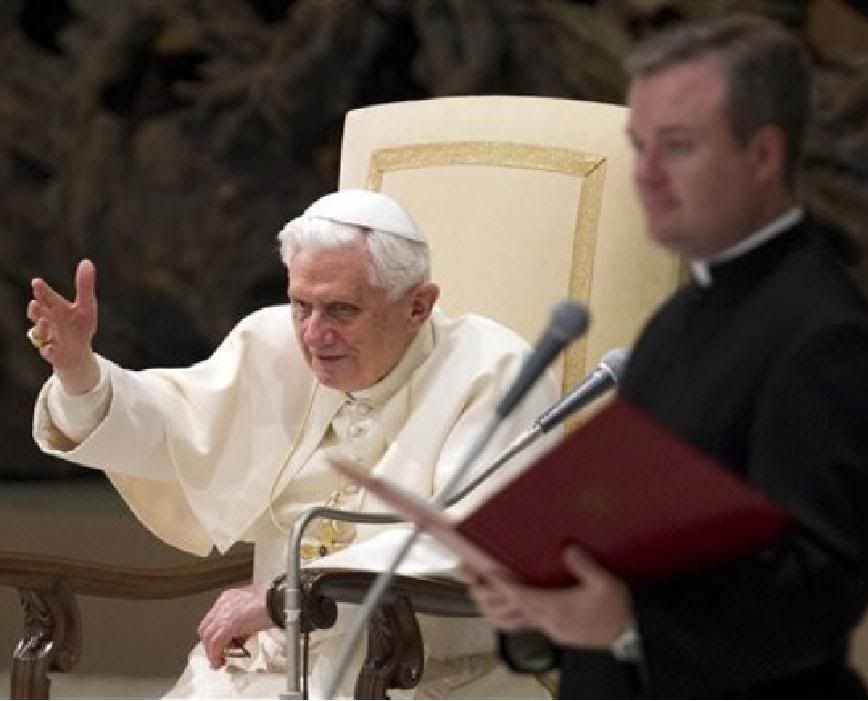
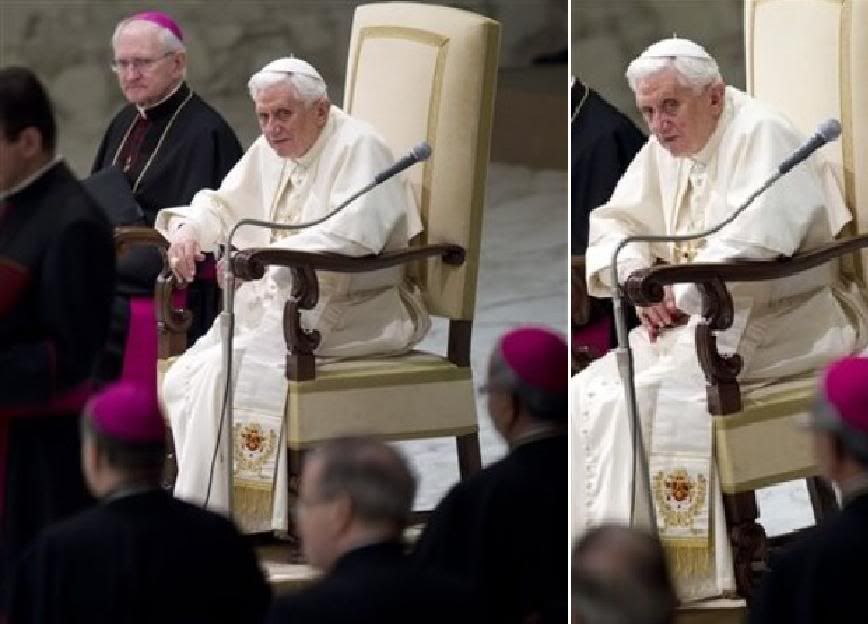
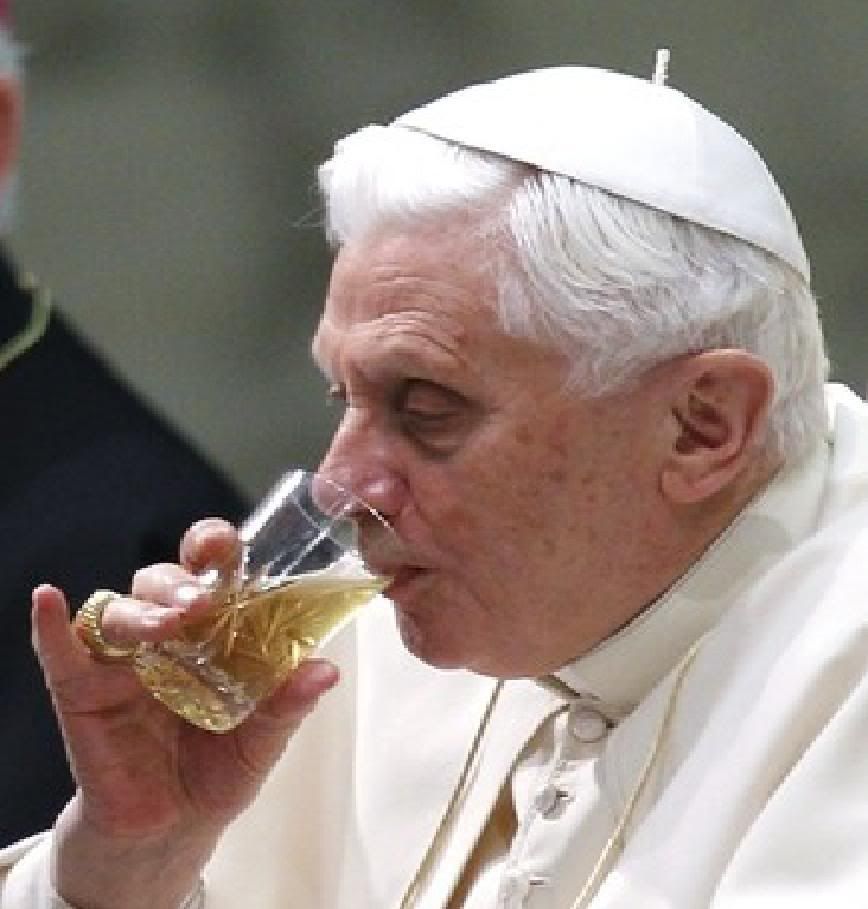
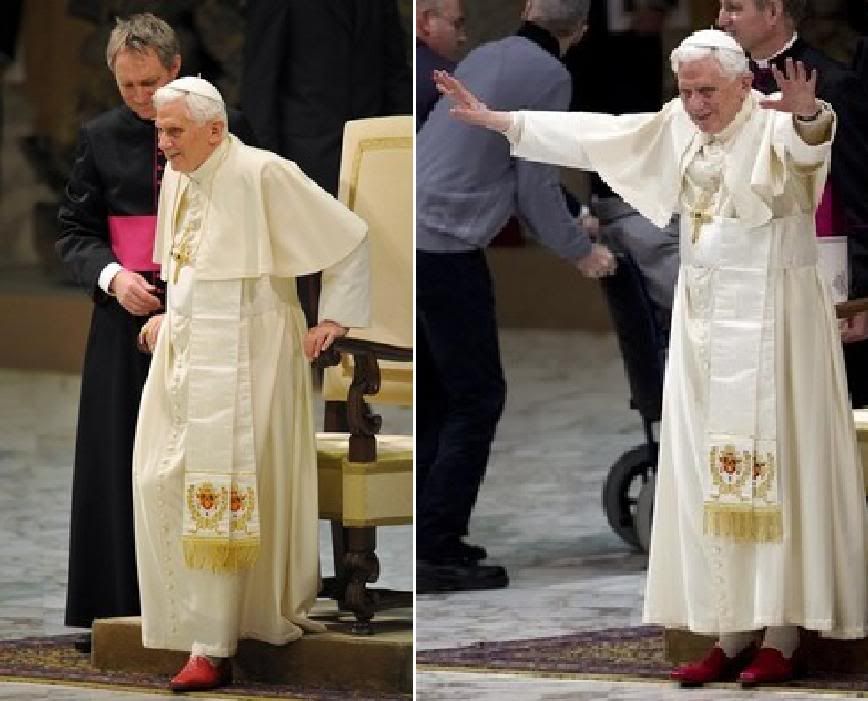
[Modificato da TERESA BENEDETTA 27/01/2011 01:17] |
| |
 26/01/2011 20:26 26/01/2011 20:26 |
|
| | | OFFLINE | | Post: 22.013
Post: 4.641 | Registrato il: 28/08/2005
Registrato il: 20/01/2009 | Administratore | Utente Master | |
|

 Not surprisingly, George Weigel - a 'biased' witness, of course, but also an unusually privileged one - has provided the best little essay so far on the subject of John Paul II's beatification. Neither Benedict XVI nor the Congregation for the Causes of Sainthood need to justify their decision at all, but Weigel's argument provides a wonderful answer for those who oppose - or even just quibble about - the beatification and its timing....
John Paul II:
Not surprisingly, George Weigel - a 'biased' witness, of course, but also an unusually privileged one - has provided the best little essay so far on the subject of John Paul II's beatification. Neither Benedict XVI nor the Congregation for the Causes of Sainthood need to justify their decision at all, but Weigel's argument provides a wonderful answer for those who oppose - or even just quibble about - the beatification and its timing....
John Paul II:
A life of miracles
by George Weigel

Jan 26, 2011
The otherwise inexplicable cure of a French nun suffering from Parkinson’s disease was accepted in early January by the Congregation for the Causes of Saints and Pope Benedict XVI as the confirming miracle that clears the way for the beatification of Pope John Paul II on May 1, Divine Mercy Sunday.
John Paul II’s life was a life of miracles — a life in which radical openness to God’s grace opened channels of grace for others.. [A beautiful definition for the 'radiation' effect of holiness. And I do not doubt that, whether the individuals concerned have articulated it or not to themselves, the reason for Benedict XVI's popularity (in some ways, exceeding that of his predecessor even) which has surprised all the secular prophets and smug pundits is that the faithful perceive the grace of holiness that he radiates.]
In April 1990, the new president of then newly-liberated Czechoslovakia, Vaclav Havel, caught this dimension of John Paul’s remarkable life when he memorably welcomed the Pope to Prague in these stirring terms:
“I am not sure I know what a miracle is. In spite of this, I dare say that, at this moment, I am participating in a miracle: the man who six months ago was arrested as an enemy of the state stands here today as the president of that state, and bids welcome to the first pontiff in the history of the Catholic Church to set foot in this land…
“I am not sure that I know what a miracle is. In spite of this, I dare say that at this moment I am participating in a miracle: in a country devastated by the ideology of hatred, the messenger of love has arrived; in a country devastated by the government of the ignorant, the living symbol of culture has arrived; in a country that, until a short time ago, was devastated by the idea of confrontation and division in the world, the messenger of peace, dialogue, mutual tolerance, esteem and calm understanding, the messenger of fraternal unity in diversity has arrived.
“During these long decades, the Spirit was banished from our country. I have the honor of witnessing the moment in which its soil is kissed by the apostle of spirituality.”
“Welcome to Czechoslovakia, Your Holiness.”
In its witness to the miracle of Karol Wojtyla’s life, Vaclav Havel’s eloquence was matched by the untutored eloquence of those thousands of people from all over the world who, spontaneously, wrote the Postulation for the Beatification and Canonization of John Paul II, telling their own stories of how this man they had never met had, nonetheless, changed their lives.
Many of the letters were from non-Christians, even non-believers. Some were simply addressed, “Pope John Paul II—Heaven” — and found their way to the Postulation’s offices near St. John Lateran in Rome.
Some of those letters reported recovery from illness; others reported even more difficult recoveries from addictions, estrangements, even hatreds.
The professor-Pope would likely have smiled at the letters reporting success in passing exams through his intercession. The Pope who lifted up the vocation of marriage and who was a fierce defender of the right-to-life of the unborn would have certainly been touched by the letters from previously infertile couples reporting conceptions after years of sorrow and prayer.
On the day of John Paul’s funeral, April 8, 2005, the people of the Church spontaneously proclaimed him a saint with their cries of “Santo subito!”—“A saint now!”
With the announcement of John Paul’s beatification, it might be said that the judgment of the Church’s leadership has now caught up with the spontaneous judgment of the Church’s people.
Yet John Paul’s sanctity was recognized not only by the people of the Church, but by the people of the world — hence all those letters addressed, “Pope John Paul II—Heaven.”
Thus the beatification on May 1 will be, in a sense, an ecumenical and inter-religious affair, in that the life of heroic virtue being recognized and celebrated was a life recognized as such far beyond the formal boundaries of the Catholic Church.
The Church doesn’t make saints; God makes saints, and the Church recognizes the saints that God has made. John Paul II was convinced that God was profligate in his saint-making — that there are examples of sanctity all around us, if we only know how to look for them and see them for what they are. His blessedness consisted in no small part of showing us the blessedness of others.
[Modificato da TERESA BENEDETTA 26/01/2011 20:47] |
| |
 27/01/2011 17:50 27/01/2011 17:50 |
|
| | | OFFLINE | | Post: 22.014
Post: 4.642 | Registrato il: 28/08/2005
Registrato il: 20/01/2009 | Administratore | Utente Master | |
|
 Thursday, January 27
Thursday, January 27
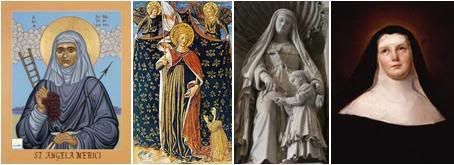 Middle photos: Painting by Bozzoli, and statue in St. Peter's Basilica.
ST. ANGELA MERICI (Italy, 1470-1740)
Middle photos: Painting by Bozzoli, and statue in St. Peter's Basilica.
ST. ANGELA MERICI (Italy, 1470-1740)
Third-Order Franciscan, Founder, Company of St. Ursula
Born in Desenzano by Lake Garda, Angela spent most of her life in nearby Brescia. Early on,
she became interested in educating poor children and joined the Third Order of St. Francis
for laywomen. In 1524, she was on her way to visit the Holy Land and was said to have gone
suddenly blind in Cyprus. She proceeded with the pilgrimage anyway, and on her way back to
Italy, is said to have regained her sight in the same place in Cyprus where she went blind.
At the age of 62, she founded the Company of St. Ursula, named after the patron saint of
medieval universities, dedicated to 're-Christianising family life' through educating girls to be
Christian wives and mothers. The Ursulines were the first teaching congregation of sisters, but
they remained 'secular' - not living in communities - for 17 years before seeking recognition
as an order. Their sisters have since then had the choice to be 'religious' enclosed nuns, or
'congregated' who follow the original plan. Ursulines were the first missionary nuns to Canada
and what is now the United States. Today, Ursuline educational institutions are found worldwide.
Mother Angela was canonized in 1807.
Readings for today's Mass: www.usccb.org/nab/readings/012711.shtml
OR today.
 'Jehanne' is the medieval form of Jeanne.
'Jehanne' is the medieval form of Jeanne.
At the General Audience, the Pope speaks about the 'Maid of Orleans':
'Jeanne d'Arc and the Name of Jesus'
 This issue also contains the Pope's homily at the Vespers on Tuesday that ended the Week of Prayer for Christian Unity. Other Page 1 news: A report on President Obama's second State of teh Union address and his call for a new 'Sputnki moment'; Violent disorders in Egypt call for an end to Preident Mubarak's 30-year rule; the French Senate rejects a proposed euthanasia lw; and the annual World Economic Forum in Davos, Switzerland, sees international government and business leaders seeking to instill confidence in Europe's economic recovery.
This issue also contains the Pope's homily at the Vespers on Tuesday that ended the Week of Prayer for Christian Unity. Other Page 1 news: A report on President Obama's second State of teh Union address and his call for a new 'Sputnki moment'; Violent disorders in Egypt call for an end to Preident Mubarak's 30-year rule; the French Senate rejects a proposed euthanasia lw; and the annual World Economic Forum in Davos, Switzerland, sees international government and business leaders seeking to instill confidence in Europe's economic recovery.
No papal announcements from the Vatican today.
[Modificato da TERESA BENEDETTA 27/01/2011 18:03] |
| |
 27/01/2011 18:43 27/01/2011 18:43 |
|
| | | OFFLINE | | Post: 22.015
Post: 4.643 | Registrato il: 28/08/2005
Registrato il: 20/01/2009 | Administratore | Utente Master | |
|



'The right to religious freedom is rooted in the very dignity of the human person' whose transcendent nature must not be ignored or overlooked. ... Without the acknowledgement of his spiritual being, without openness to the transcendent, the human person withdraws within himself, fails to find answers to the heart's deepest question as about life's meaning fails to appropriate lasting ethical values and principles, and fails even to experience authentic freedom and to build a just society.
— Benedict XV, Message for the World Day of Peace, 2011
At present, Christians are the religious group which suffers most from the persecutions on account of its faith.
— Benedict XVI, Message for the World Day of Peace, 2011


January 27, 2011
I.
Robert Royal, author of the Catholic Martyrs of the Twentieth Century, recently wrote, "Many people, especially in the developed world, find it hard to take seriously that there has been systematic Christian persecution in modern times, especially of the Catholic Church as the largest and most cohesive Christian body" (Catholic Thing, January 13, 2011).
The facts are otherwise, of course, and we wonder why the facts are not noticed, even by Catholics. We find that Benedict XVI, in his recent "World Day of Peace" message, as cited above, states the same truth. Even though Scripture tells us that we should expect such things, we find it hard to admit the fact.
"Why is this?" In part, I think, it is because much of the persecution is found in the Muslim world where it is seen as an exercise of "religious freedom" as they understand it.
It also comes from the fact that the secular mind wants to think that all religions are fanatical by definition. A few odd religious people killing each other are to be expected. The only solution, in such sectarian minds, is to get rid of religion.
Still others think that everyone has freedom of religion and the killings are due to a few extremists.
The Holy Father recognizes that, in light of the targeted killings of Copts and Catholics in Egypt and Iraq especially, he needs to state what is at stake — what is the central issue.
"It is painful to think that in some areas of the world it is impossible to profess one's religion freely except at the risk of life and personal liberty." Just where these places are is not mentioned. Everyone who keeps up with the news knows generally, but the press itself rarely delves deeply into these causes.
The Pope thus presents again the basic teachings of the Church on religious liberty and its public expression. "Religious freedom expresses what is unique about the human person, for it allows us to direct our personal and social life to God, in whose light the identity, meaning and purpose of the person are fully understood."
The whole purpose of our lives in this world, after all, is that we reach our final end, no matter what civil society we live in.
Benedict states frankly that religion has a public purpose. It is to be an actor, after its own nature, in any discussion of humanly important issues. It does this acting not only by its charitable and educational works.
Benedict says in Light of the World that the organization that takes care of more AIDS patients in the world, on the ground, so to speak, is the Church. Much of the actual charitable aid given in the world comes in fact from religious sources and motives.
But this right to religious freedom also includes the ability legally to present what the Church is in such a manner that it can be openly taught and spoken of — even converted to — without fear of death or imprisonment. The number of nations in which such religious liberty actually exists is rather small in comparison with those in which it does not.
The Church comes at the notion of religions liberty not from its own institutional need but from what it is to be a human person. The human person is a free, reasonable being. He needs and wants to know his destiny and purpose. He wants to follow those institutions and means that offer them to him; he wants to hear freely the essential things he needs to know to achieve his purpose in life.
John Paul II had called religious liberty "the first right," something reflective of the American First Amendment. It is "first" because if we are free to do everything else but what is most essential, then our freedom is illusory.
Benedict himself says "Religious freedom is at the origin of moral freedom" (#3). Moral freedom means that we seek our final end in all we do. Our second nature means the sort of being we make ourselves to be through our choices and actions. Primary in this "making" of ourselves is how we stand to God.
II.
"The transcendent dignity of the person is an essential value of Judeo-Christian wisdom, yet thanks to the use of reason it can be recognized by all" (#2). Thus, if we read this statement carefully, we see that Catholics do not base their understanding of religious freedom primarily on divine revelation.
It is true that, if God has given us something to tell others, they have some obligation at least to hear it. But they need an opportunity to do so. This opportunity is often denied or restricted by civil powers or religious systems. This restriction indicates a disordered polity.
But the approach here is from the other angle. "Openness to truth and perfect goodness, openness to God, is rooted in human nature; it confers full dignity on each individual and is to guarantee of full mutual respect between persons" (#3).
We ask: "What is it a human being needs and ought to have?" The Church wants to be presented to him only through his willingness to receive it on the basis of grace and evidence.
The Pope is aware that religious freedom is denied by religious and political laws in many nations. He seeks a grounding of the legal and civil order that rests on a common reason that can formulate the rule that freedom of religion allows for the highest things to be brought together.
"Religious freedom is not the exclusive patrimony of believers, but of the whole family of the earth's peoples. It is an essential element of a constitutional state; it cannot be denied without at the same time encroaching on all fundamental rights and freedoms, since it is their synthesis and keystone" (#5).
The civil order itself has as its end the fostering of the actual good of each of its citizens. Among these goods is the highest good. The civil order does not itself propose what this is, though it can foster the beliefs and practices of religious bodies in the name of the common good. It can certainly cease to be an impediment.
"The profession of a religion cannot be exploited or imposed by force. States and the various human communities must never forget that religious freedom is the condition for the pursuit of truth, and truth does not impose itself by violence but 'by the force of its own truth'" (#7).
The Pope warns about religious and anti-religious "fanaticism and fundamentalism". He is opposed to all sorts of violence.
One thing this address seems to be lacking is discussion of the need of police and armies to protect those constitutions that do respect freedom of religion. The closest the Pope comes to this issue is in the following passage: "Religion is defended by defending the rights and freedoms of religious communities" (#13).
Who is to do this defending? With what? This explanation is still vague about what needs to be done and who can carry it out. [But police and armies do not act autonomously - unless they carry out a coup d'etat, they act on the orders of whoever leads the government they serve! The defense obviously must come from government, any government, but obviously, this does not happen in countries where a state religion is enforced and there is no religious freedom for those who do not profess the official religion.]
Whenever Catholics are persecuted in various countries, however, the Pope calls on the government to prevent such violence. The assumption is that a) this prevention is the obligation of the government and b) the government has the coercive means to do so. Otherwise, it is futile to complain.
While it may be true that "violence is not overcome by violence" (#14), the fact is that when violence erupts it must be met with adequate force if the religious freedom of those being persecuted is to mean anything. [The Egyptian government went through such an exercise - a conspioicous nationwide deployment of force on Orthodox Christmas Day - but they were not put to the test since no Muslims (or Copts) tried any violence that day (other than the isolated incident of the off-duty policeman who shot at Copts on a Cairo-bound train and killed one). However, reliable witnesses have said that Egyptian security forces guarding the Akexandria church that was bombed on New Year's Day said those forces leftheir posts one hour before teh car bomb was set off.]
It is not the Pope's intention to foster martyrdom by letting violence go unopposed. The distinction between "religion" and "fanaticism" needs much clarification as so much violence does come from "religion," as the pope acknowledges.
III.
"With due respect for the positive secularity of state institutions, the public dimension of religion must always be acknowledged. A healthy dialogue between civil and religious institutions is fundamental for the integral development of the human person and social harmony" (#9).
The state must know the limits of what it is competent to do. The Church must understand that its mandate is not political. But the two sources can and should work together.
In the context of religious freedom, Benedict brings up the question of relation to other religions. Ecumenical approaches have generally been used to govern this relationship so that the good of a forum or opportunity to discuss peacefully the differences of religion has governed this issue.
The Pope mentions that the upcoming World Day of Prayer for Peace, which will be held in Assisi in October, is part of this issue. This is the twenty-fifth anniversary of the original meeting under John Paul II.
Not a few worry that this sounds like a kind of religious syncretism or a sort of United Nations umbrella under which all religions were considered equal and equally dubious.
The Pope has tried a pre-emptive strike to assure us that praying together is a simple and good gesture that does not involve any judgment on religions, though it seems that those who do foster violence should be excluded.
When we look at all the world's religious leaders and their theologies, we often wonder if there is any sense in which they are "praying" to the "same" God. The spectacle can give secularists cause for thinking that it is all a confusion.
"The path to take is not the way of relativism or religious syncretism," Benedict writes. "The Church, in fact, 'proclaims, and is in duty bound to proclaim without fail, Christ who is the way, the truth and the life (Jn. 14:6); in Christ, in whom God reconciled all things to himself, people find the fullness of the religious life'" (#11).
This passage recalls Dominus Jesus, the document on the necessity of salvation in Christ, which the Pope authored while he was at the Congregation for the Doctrine of the Faith.
So why meet? This statement of what Catholics hold is well-known to all invited. Praying together "in no way excludes dialogue and the common pursuit of truth in different areas of life."
Praying together is obviously a first step of respect. If religious people cannot do this, what is the rest of the world to think of them? Each prays in his own way. No implication is given that anyone agrees or disagrees with the respective theologies of prayer.
The purpose of the World Day of Peace document is to foster peace. This can ultimately happen only if a society is "reconciled with God" (#15). This phrase, I suspect, is what is behind the Pope's whole effort to re-present the issue of religious freedom.
He first seeks a civil society in which citizens are free to practice and explain their religion in peace. He does not bring up the delicate question, as he did in the Regensburg lecture, of whether some religions in their very teachings themselves foster violence as a religious principle. This issue needs to be addressed much more frankly than it usually is.
But politically and prudentially, it is sometimes better to overlook certain issues until some forum of trust can be established. This Pope, I have noted, also looks to the long-run. The "answers to man's deepest questions" cannot be found outside of man's religion and its pursuit of truth, including the truth of revelation and the freedom to testify to its meaning in all existing civil societies.
The Pope's constant insistence that there is a philosophy to which all religious minds are or should be open is his way to insuring that the possibility of explaining the Gospel in all nations exists.
[Modificato da TERESA BENEDETTA 27/01/2011 18:53] |
| |
|
|
|
|